DEI ISDEAD



Faculty, staff, clubs point to overcompliance
FOUSIA ABDULLAHI editor-in-chief fousia.abdullahi@my.tccd.edu
Two employees were fired, two others were disciplined and 48 events were canceled or modified due to Senate Bill 17 compliance, according to a TCC document obtained through an open records request by The Collegian.
The two fired employees, who worked in Organizational Excellence and Development, were terminated when the college was made aware of diversity, equity and inclusion content in a TCC mandatory training video.
One employee was disciplined for conducting a Microaggressions & Mental Health workshop, and another was disciplined for bringing the women in an administrative suite flowers with a card attached saying “Happy International Women’s Day.”
“I cannot go into specifics about employee discipline, but what I will say is that the statute requires that if we find that an employee violates SB-17, we are required by law to discipline, up to and including termination,” said General Counsel Antonio Allen in a Teams meeting on Aug. 30.
The 48 events celebrated or addressed heritage, race and ethnicity, gender and sexual orientation. They include Hispanic Heritage Month, Black History Month, Asian American Pacific Islander Month, Women’s History Month, Pride Month, Diwali events and the International Festival, all of which had been organized and hosted by the college in previous years.
The document showed that other cancellations or modifications included
events related to women’s health, domestic violence and a showing of the sports movie “Glory Road.”
This information comes as students, faculty and staff are expressing fear and frustration over the state law that bans DEI in higher education and what they see as TCC’s overcompliance with it.
The law, which was passed by the Texas Legislature in 2023, opened the door for lots of questions from students and staff about its effect on how events are approved and organized.
It’s not just leaders and members of cultural clubs who are concerned about how the bill is being implemented, but all clubs that advocate and support diversity on campus.

“I think TCC has really chosen not to push back majorly against Texas and our current [U.S.] president on their stance on DEI,” said Marina Maranto, NE president of the Neurodiversity Club and the Tabletop Role-Playing Game Club. “And I think that’s a shame. I can understand the college’s stance and the reasons for it. I do still think it is a shame.”
The concern from students like Maranto is that if clubs and student organizations are further restricted, they will lose valuable college experiences.
“This community that we built will cease to exist,” Maranto said. “Studies and research have shown that once a stu-
dent finds that community, finds a home on campus, they are much more successful. They’re a better student, they engage more with learning, they engage more with the university and it just leads to a more well-rounded individual.”
While the bill doesn’t address disabilities, she said this could still impact a number of students, even in the Neurodiversity Club.
“I think you would see a lot of students not succeeding,” Maranto said. “I think right now, the autistic student graduation rate is already somewhere in the low teens. I would see that dropping even further.”
Staff and faculty are having to rework, cancel and even limit the support they can give to student clubs so that they are not disciplined or fired.
“I think as much as many of us disagree with the premise of this bill, we have to realize that this isn’t an option right now,” said Kristin Byrd, biology professor and former president of the NE Campus Faculty Association. “We don’t have any options. This is not something we can wiggle our way out of, so we have to work smarter and not be frustrated.”
Events across the district have been canceled or changed to avoid failing the DEI litmus test even though the law says student clubs and organizations can hold cultural events with conditions.
Richard Gonzalez, an author, columnist and Tarrant County resident, was invited to speak at the 15th annual Abrazando al Éxito event celebrating Hispanic Heritage Month. The event was scheduled for Oct. 11, but according to Gonzales, he was informed over email on Sept. 27 that the event was canceled because it violated SB-17.
Gonzales said he was disappointed that TCC administrators, without the knowledge of the chancellor, canceled the event after people were invited, food was ordered and promotions went out.
“Learn to navigate SB-17 successfully. Communicate with the community your methods of honoring heritages without violating SB-17,” Gonzalez said at a TCC board meeting on Oct. 17. “Please be
ASH PETRIE features editor ashleigh.petrie@my.tccd.edu
A single piece of paper titled “Spring 2025 Proposed Events” hangs beside Ash Vadnais’ desk inside SE Campus’ Student Activities office. The list of 24 events, which are covered in dashes and marks, contrasts with the previous semester’s Excel spreadsheet listing 46 approved events.
The sheet was curated by Vadnais and other student workers at the beginning of the semester to keep track of events and their approvals. Since then, they’ve struggled managing the list due to event cancellations and changes related to Texas Senate Bill 17.
“I don’t even know where to start,” Vadnais said. “Most of the time as workers, we hear about events approval like an hour or two hours before.”
Vadnais and students across the district say their lives on campus have become increasingly difficult following the law, which took effect in 2024 enforcing a diversity, equity and inclusion ban in higher education, has negatively affected campus culture.
Prior to the law, advisers would help create, organize and fund both meetings and activities held for students on campus. Now, they are no longer allowed to coordinate anything concerning DEI, and cultural events must be entirely student-led to meet SB-17 requirements.
“I understand the argument it has to be pushed from the students, but it’s kind of useless because what students want is to be seen by the school,” said SE student Leslie Zacarias, a Student
Events, Page 7 See Report, Page 6
HOPE SMITH campus editor hope.smith@my.tccd.edu
The Jim Bolen Mathematics Competition first-place winner in the TCC district-wide competition is an 11-year-old boy.
The awards ceremony returned for its 37th year to award top TCC student competitors in subjects ranging from algebra, trigonometry, geometry and analytical reasoning.
The winner Derek Jiang is in seventh grade, and while taking higher education classes at TCC found out about the Jim Bolen Mathematics competition through his teacher.
He explained what inspired him to join was his skills.
“I’m kind of good at math, and I seem to have a talent,” he said.
He’s a self-study student and his favorite class he’s taken so far is calculus three. Jiang is unsure what his next steps are for his classes but likes the idea of taking a few physics classes.
The Jim Bolen Mathematics Competition is a student mathematics league established by the American Mathematical Association of two-year colleges.
In preliminary results, the competing

TCC students ranked first in the southwest region in the fall of 2024 and seventh in the nation this spring.
According to NW Campus Vice President of Academic Affairs Thomas Sosa, TCC is on track to be No. 1 in the southwest region for nine consecutive years.
During the ceremony, NW Campus President Zerena Blankenbaker said she was proud of the success the competition has brought for TCC and the impact it has on the college.
“What we celebrate today goes beyond test scores or rankings,” she said. “This moment is a reflection of the collective strength of our college, our faculty, academic leaders and student support teams all working together to create opportunities for growth, achievement
and discovery at Tarrant County College.”
Another student competitor, Johhny Tren, is an international student from Vietnam. In total, he received eight awards split between the fall and spring semester. He felt that competing at TCC gave him the feeling of being acknowledged and involved with a high-level institution.
Tren decided he wanted to compete last year in the fall after seeing the courses offered at TCC.
“I realized with all the math courses I could take at TCC I already did all of them in high school back in Vietnam,” he said. “So might as well put it to the test and see how well I can do mathematically in a foreign country.”
Included was a variety of cash prizes
from the Campuses. Along with that, the Tarrant County College Foundation, Angelo State University, University of Texas at Arlington and TCU provided scholarships per semester and up to certain amounts of money.
The highest, which was awarded by TCU, was a $250,000 scholarship to Christopher Manquez.
At the end of the ceremony, Sosa left off saying that he was proud of the students and knew that they would continue to make TCC proud in their future careers.
“To all the students who participated in the TCC Jim Bolen Math Competition, your passion for mathematics, your pursuit for excellence and your dedication to learning are truly commendable,” he said.
LAUREN HARPER
multimedia editor
lauren.harper903@my.tccd.edu
Three candidates are voicing their concerns and goals should they be elected to the District 7 seat in the upcoming board of trustees election.
Former Fort Worth mayor Kenneth Barr, who has overseen District 7 in the southwest Fort Worth and Benbrook area since 2019, decided against an additional term.
In a public forum hosted by the Fort Worth Report, KERA, SteerFW and the League of Women Voters, all three candidates were asked about their stance on diversity, equity and inclusion.
It’s a topic the forum’s commentator said headlined TCC’s effort to comply with Senate Bill 17, specifically after the NAACP moved an event set for South Campus due to the col-

lege “unexpectedly” pulling its sponsorship from the event.
Candidate and Tarrant County business owner Cary Chesire said he fully supports SB-17 and said the results of last November’s election revealed the people of Texas agree.
“The [Texas people] do not want diversity, equity and inclusion. They do not want critical race theory, and they believe there has been a shift within academia, particularly within higher education, where their tax dollars are being marshaled against them,” he said. “If you want to do something DEI-related, you should probably go do that at home.”
Candidate Veronica Chavez Law, a commercial real estate and banking lawyer, said that while building her campaign, she took into account SB-17 and its impact on TCC.
“TCC needs to follow the law,” she said.
“It’s time we stop focusing so much on the color of students’ skin to differentiate them, and instead, focus more on getting as many people

in our community educated. I would rather focus on that than trying to focus on whether DEI is in the classroom or not.”
Hunter Crow, a candidate and former student at TCC in 2022, said he’s a firm supporter of DEI but understands how the board responds to recent restrictions is limited.
“Because the state of Texas criminalized the practice of DEI … the board has no choice but to comply,” he said. “What I’m proposing is increasing student access to academic resources such as counseling for students that previously had DEI benefits and also have resources where they could get financial help if they needed it.”
All three candidates included a focus on the school’s use of funding during their campaign, promising a push toward a transparent and effective use of the budget.
Law said her goal is to prioritize the taxpayer by ensuring an efficient and transparent use of the college’s budget.
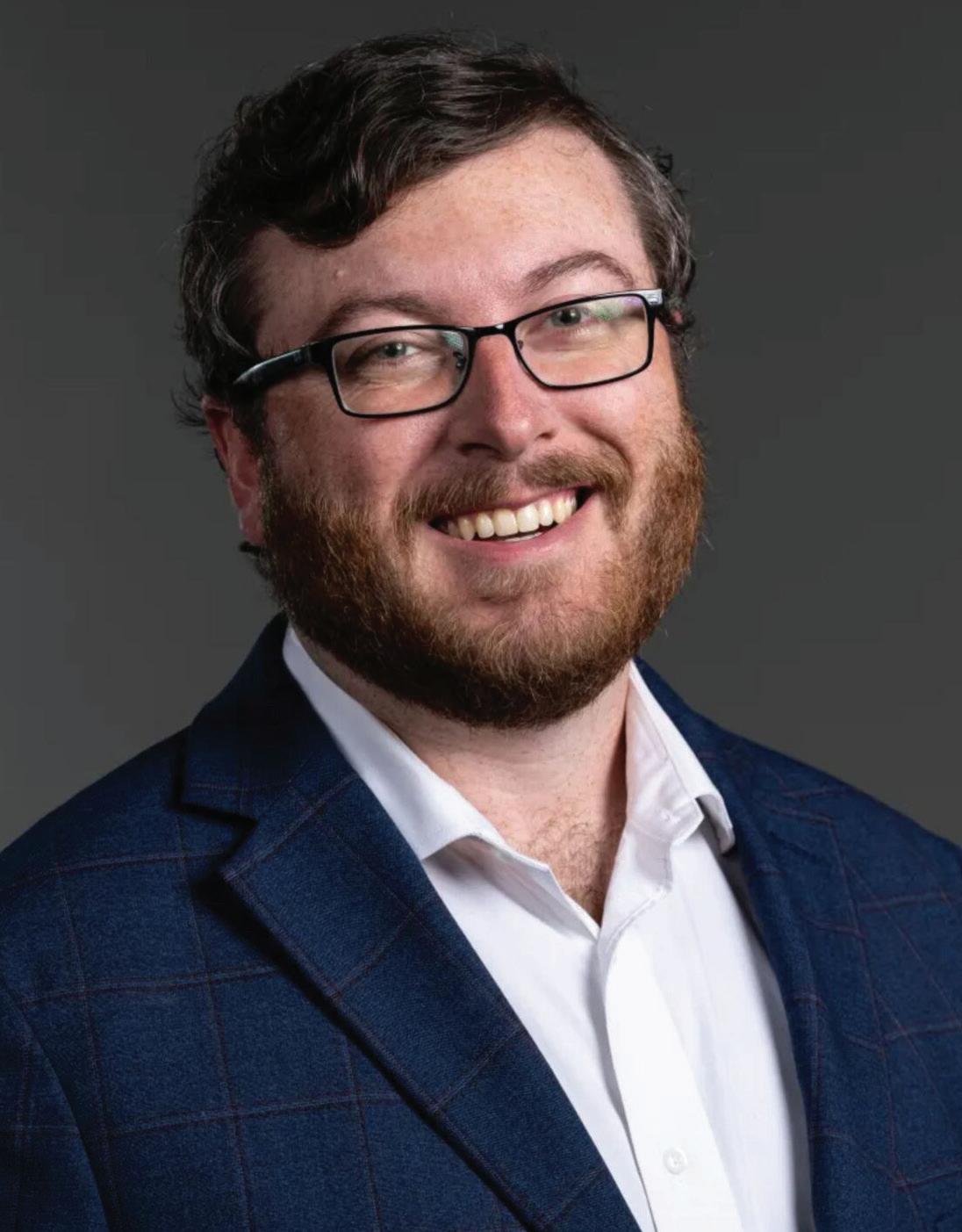
“I want people to appreciate the Tarrant County College system and what it brings to the community,” Law said. “If we can show the taxpayers a return on their investment, then TCC will be appreciated more, and people will feel better about the taxes they’re paying into TCC.”
Cheshire said that most students today are attending college to seek a qualification that leads to a higher salary, instead of personal interest. He said that where the school focuses its resources should reflect that.
“We need to be focusing on cutting costs and providing value so that students can attend college in a very affordable manner and then go into the workforce and have a lucrative career,” he said. “I think that government intrusion into that atmosphere has created the student loan crisis that we have.”
Cheshire said if elected, he hopes to build stronger relationships with the business community.
“When you have businesses that are clearly articulating the skills and qualifications that they’re looking for, that helps tailor our programs,” he said. “We can deliver more value at a lower cost to our students and taxpayers.”
While studying on South Campus, Crow said he heard numerous complaints about rising taxes after major college renovations.
However, Crow said he believes these financial growing pains are sometimes necessary.
“There are a lot of facilities at TCC that need renovations, and in order to have these upgrades, the costs are significantly higher. I want to find common ground on property taxes and ensure there’s accountability,” he said.
District 6 covers east and southeast Fort Worth and is also on the upcoming ballot. Gwendolyn Morrison, who’s held District 6 since 1976, is running again, unopposed. Election Day is May 3. Voting is available on South Campus.
WILL FLEMING V staff reporter collegian.editor@tccd.edu
Dozens of students gathered at the NE tennis courts to learn and play pickleball April 23. The event was hosted by NE Student Activities and encouraged participation from students of all skill levels and backgrounds. The courts were filled with the rhythmic bounce of balls and the laughter of students trying the sport for the first time or sharpening their game.
Pickleball
in singles or doubles, making it accessible to a wide range of players, including those looking for a more joint-friendly alternative to traditional racket sports.
Jordin Bryan, a student development associate helped organize the event, was excited to share both the fun and the physical benefits of the sport.
“Pickleball is fun, and if you play doubles, it is better on your knees,” Bryan said, referencing the lower-impact nature of the sport compared to tennis or basketball.
For many of the students, the event was a chance to try something new while also taking a step toward a healthier lifestyle. They said the balance and ease of play are appealing.
NE student Zander Grijulva, who joined the event with a few friends, said pickleball has potential to support both physical and
mental wellness.
“Pickleball is a great learning opportunity for a great health activity,” Grijulva said.
NE student Aaron McGrue pointed out that the accessibility of the sport is part of its appeal.
Unlike some sports that require intense training or prior experience, pickleball allows players to jump in with minimal instruction.
“Pickleball is competitive without hard work,” McGrue said. “I recommend it, and it is for everyone, all ages.”
During the event, students paired off in doubles matches, rotated courts and cheered each other on during longer rallies.
Some brought their own paddles, while others borrowed equipment provided by the college.
As the event continued into the after-
noon, the unexpected happened: a swarm of honey bees flew over the tennis courts, sending students and staff ducking for cover. The moment caused a temporary pause in play and some nervous laughter, but no one was stung and play resumed shortly after the swarm moved on.
Waylan Shinn, a NE student who often plays with his family, said pickleball inspires competitive spirits.
“It gets you out of the house,” Shinn said. “My dad beats me when playing pickleball.” Organizers said they hope to continue offering pickleball events in the future as interest in the sport grows.
Nationally, pickleball has seen a surge in popularity, with millions of players now participating across the U.S., according to the Sports & Fitness Industry Association.


Duke said she’s only been at TCC since January, so she didn’t expect to receive anything, let alone a card from the president.
By 8 a.m., students and employees are just arriving to South Campus, but President Dan Lufkin has already been on his feet for hours.
As a former college basketball player, he’s no stranger to getting up early, starting his day at 5 a.m. and by 6 a.m. he is in the gym playing basketball or walking on the treadmill.
Before stepping into his first meeting, Lufkin takes a familiar path cutting through campus on his bike, greeting everyone he comes across with a smile and a wave. He pauses to ask people how their week went, shares a laugh with the groundkeepers and picks up conversations where they left off.
“The importance of it is to build a welcoming community and something that is critical,” Lufkin said. “I want other people to do it with others so I’m just modeling that engagement. And for the staff and faculty, I always remind them to help students around. It’s an expectation because we are all here for the students.”
Building a community takes more than just a couple smiles and waves, and Lufkin said he understands that. During his morning rounds Lufkin walks into the Veteran Resource Center and was greeted by administrative assistant Christine Duke, who thanked him for the handwritten birthday card she received in the mail.
“To me it means I’m seen, I’m heard and I’m important to this role, and I’m important to TCC,” she said. “Coming from a corpo rate environment, you’re just a number. So having that one-on-one gives you more of a relationship, so it just really means a lot.”
After his morning ride around campus, Lufkin dives into a packed schedule of meetings — resource workshops, reviewing board items, discussing campus renovations and any one-on-one meetings on his calendar.
Lufkin said the workload can be difficult, but in his four years as campus president, he has developed a system to ensure everything goes as planned.
“I don’t look at my schedule until the night before just because it can get overwhelming in terms of all the places I have to be and meet ings I have,” he said. “I know what I’m doing a week out so I can prep, but otherwise I take the days as they come.”
Kay Harkness, executive assistant to the president, said she understands some of the hardship that come with his schedule.

inspire people around him
set that it can often change, but we work together to effectively manage those needed adjustment.”

“I am constantly monitoring his calendar,” she said. “It is a daily responsibility, and I approach it with the mind-
After a cup of coffee and a morning full of meetings, Lufkin finally has time to catch his breath and grab a quick bite. He usually brings his lunch from home but on this day, he had the time to go out to eat with others before jumping right back into another meeting at 1 p.m.
Even with the lack of free time, Lufkin said he wants people to know he has an open-door policy and that they shouldn’t be scared to approach him.
“People will come up to me and say, ‘I know you’re busy, sorry,’ but we’re all busy,” he said. “Everyone has something going on. I’m not this untouchable figure. I’m just a guy. I make sure anyone who wants to meet with me has the opportunity.”
By 3 p.m., Lufkin has made his way to TR Campus for the 37th annual Jim Bolen Math Competition Award Ceremony, greeting students and faculty as he enters the crowded room. Between shaking hands and posing for photos, he takes a moment to reflect on why showing up matters.
“When you see students crossing a stage, shaking hands with somebody, accepting an award, people clapping for them ... it just automati-
cally puts a smile on my face,” he said. Lufkin said these moments offer a break from the daily challenge of leadership.
“When I come to an event like this, it puts it into perspective all of the challenges we may endure,” Lufkin said. “Some of the hardship, some of the hard conversations, it just, for that moment, goes away and you see the results of the work you do.”
In addition to his duties as campus president, Lufkin teaches a class at TCU about governance at higher education institutions, and he bumped into one of his students at the math awards ceremony.
Mariza Saenz Olmos, coordinator of lifestyle and community learning at TR, is in Lufkin’s class with 10 other TCC employees.
“He has a great overview and knowledge of all the things surrounding higher education,” she said. “He’s also funny, reasonable and very considerate.”
As soon as the award ceremony ends, Lufkin is already on his way back to South Campus for another closing reception and award presentation.
“I used to prepare a speech or talking points, but I’ve learned students just want to be celebrated and acknowledged for their good work and accomplishments,” he said. “Students want to hear from your heart. They want to hear you be you not something scripted.”
By 8 p.m. Lufkin gets home in time to watch his New York Knicks beat the Detroit Piston in a close 118-116 finish to take a 2-1 series lead, ending his day on a high note.
A Canadian Goose laid her eggs behind the NBSS building a few weeks prior. Just a week ago, the goslings hatched and started their journey weaving through campus life.
Canadian Geese are a protected species under federal law in the U.S. through the Migratory Bird Treaty Act. Because of this, the nest near NBSS was taped off with a sign warning passerby of proper treatment and avoiding feeding them for safety reasons. Though the nest has moved now, they can and are often seen trotting around campus during the day.



CHEYENNE SHAWN campus editor cheyenne.shawn@my.tccd.edu
TR Campus’ Veteran Resource Center recognized veteran students who are graduating or transferring after this semester.
The Hail and Farewell event April 24 highlighted the accomplishments of the veteran students and acknowledged their dedication. Each honoree received a stole representing their branch of military service. Those who were active members of the Student Veterans of America received an honor cord, both of which may be worn during graduation ceremonies.
TR Vice President of Student Affairs
Jason Abreu, along with Carla Cauley and Vanessa Duran from the VRC, spoke at the beginning expressing their gratitude and reaffirmed TCC’s commitment to supporting them through their academic journey.
Duran mentioned during her speech “help you grow and see you go,” as she was talking about her time spent with the students.
A couple of students shared their experience on their time at TCC, their future plans and how the military helped shape their academic success.
“My military experience helped me prepare for college with time management,” TR student and Coast Guard veteran student Cassandra Castillo said. “It helped me push through things that are uncomfortable and strive beyond the uncomfortableness because that’s how you grow as an individual.”
Many spoke about the challenges of going from the military to college and how the VRC made that transition smoother.
“I’m grateful for having the support sys-
Police explain necessity of proper, safe crisis response
MICHAEL ARANA staff reporter collegian.editor@tccd.edu
The Fort Worth Police Department’s Crisis Intervention Team discussed reshaping emergency response for mental health support on April 23 on NE Campus.
Mental health is an obstacle police deal with from both sides of the front lines. That’s why the CIT trains units on managing trauma and de-escalation tactics for both the individual and officer.
The CIT unites with the Homeland Security Unit along with the FBI. They aim to reduce the impacts of behavior that comes with violent crime that are sometimes tied to mental health issues.
“We're always striving to make things better, we sit around and talk all the time about how we can improve it,” Detective Mike Royal said. “Because certainly with mental health issues, there's 100 different ways to approach 100 different situations. Every single one of us here is different.”
Officers face hundreds of encounters a week, situations ranging from calm to uncooperative. CIT officers are trained to handle the most severe cases in a non-violent, passive manner. One tactic used to de-escalate is using casual talk to gain trust. According to the department, the force has seen an increase in success due to the contribution of mental health professionals.
“Since 2017, we've only had two uses of force,” Police Sergeant Jake Hobson said. “I think that says a lot to what we do as crisis officers.”
Still, officers can experience PTSD from day-to-day duty. Hobson shares an experience during field training, when he had his first encounter with a deceased person. He was in a hotel that night and his Motor Transport Officer told him to do ‘what he needed to do.’
“I woke up in the middle of night, and I thought that the deceased person was in my apartment, he said “I got my gun out, and I [slowly] cleared my apartment. That's the beginning of trauma.”
To help officers recover and heal from on-duty trauma, they created the Blue Chip Program. Officers take a provided blue poker chip, allowing them to attend a free therapy session, which they can go to as many times as they'd like. The therapy sessions are tailored to the trauma the officer faces.
“You want to be a cop? Help yourself, because [if] you can't get there, you can't help other people,” Hobson said. “You’re broken. You just don’t know it.”
Veterans and students spoke about their experiences with law enforcement. They had the opportunity to ask the panel how they would have responded to their previous encounters and how officers approach veterans with PTSD.
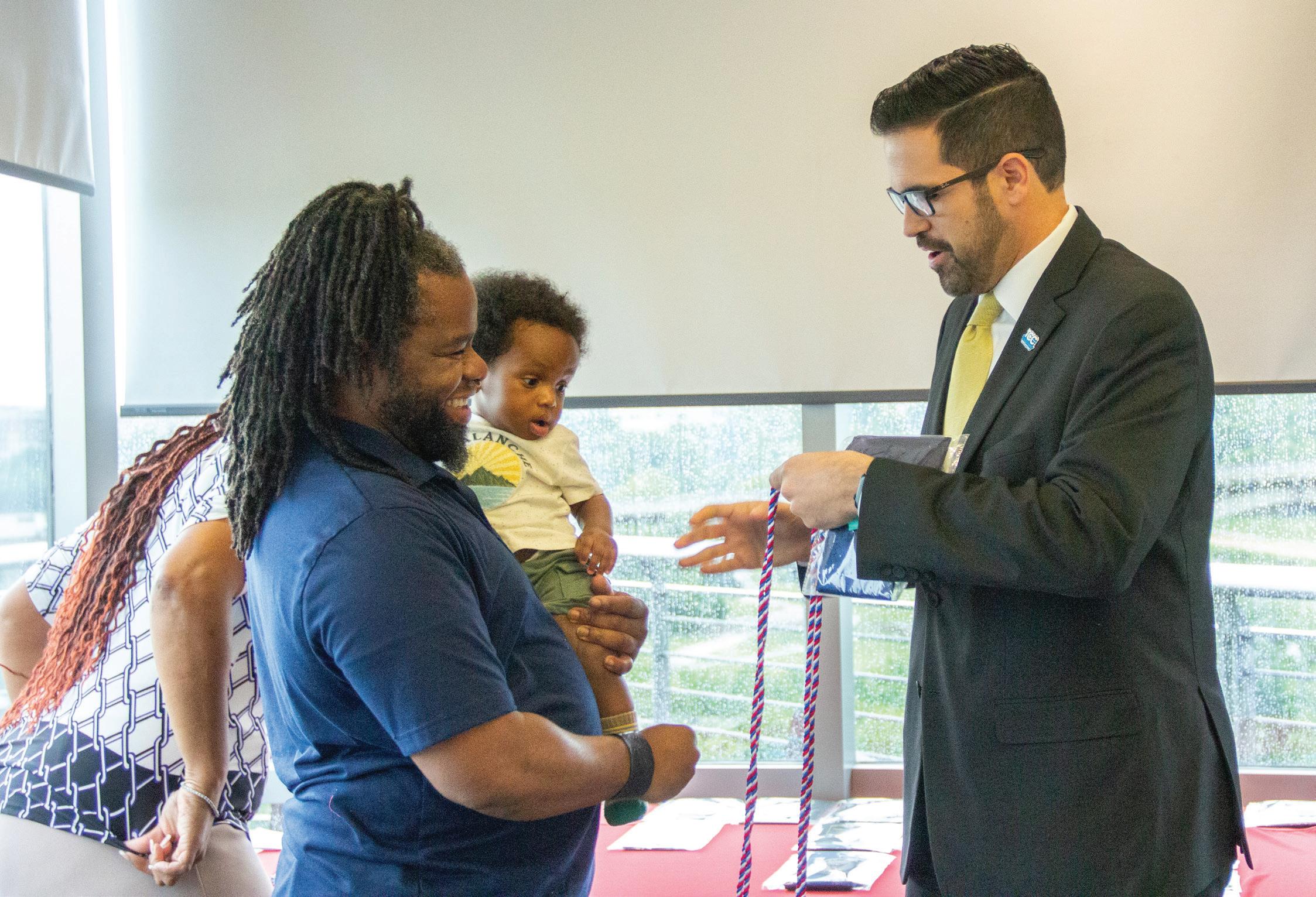
tem we have here,” TR student and Marine veteran Ricardo Avitia said.
Anali Cervantes and Blake Rodriguez, who both transferred last semester to TCU,
returned to share their experiences about life after TCC.
“Moving from a community college to a big college has been a little bit challenging,”
Cervantes said. “It’s a lot more workload, but luckily there’s a lot of resources there. So, it’s been taking some adjusting, but I’m getting there.”
JAREN HANNA staff reporter collegian.editor@tccd.edu
Students had the opportunity to give back to the community at the Big Day of Service event on NE Campus.
Students came together to volunteer at different places in the community on April 26. The event used to be held annually before the COVID-19 pandemic, and it was important to staff and students alike to bring the event back.
“It’s important to give back to the community,” Cara Walker, who works for student development services, said. “I hope [students] will take away how gratifying it can be to give to others.”
The volunteers met in early morning, where they broke into two working groups.
One group volunteered at the Tarrant County Food Pantry, and the other volunteered at the
Animal Shelter.
NE student Marco Alvarez said he did not know what to expect when attending this volunteer job, and it was his first time at the food pantry. He thought it would be completely different.
“I imagined it like how you see in a movie, like a kitchen,” Alvarez said. “But no, it was a big ... warehouse with a lobby and everything.”
The students at the food pantry were packaging potatoes for around three hours but had fun while doing it. Alvarez said there was a feeling of camaraderie between all the students.
“They had music playing, [and] people were singing and dancing. There was a whole lot of teamwork,” Alvarez said.
The other volunteer group that attended the animal shelter also found synergy and teamwork at their job.
These students took care of puppies and a kitten, doing things like playing with them
for exercise and giving them lots of needed attention.
Some students went the extra mile and even tried training some of the puppies.
“I was teaching two puppies how to lay down, and they learned,” Rachel Tolle, a NE student who volunteered at the shelter, said.
The students also said a lot of the animals are up for adoption and urged their peers to reach out and give them a home.
Some students were even requesting off of their weekend shifts at their jobs to be able to attend this event.
“I volunteer at almost every event that involves student activity,” NE student Isabella Bartram said. “I think it’s really amazing how many people actually [showed up.]”
There were around 50 students that volunteered for this event, with many excited for the next one.
“I wish there [were] more events like this,” Bartram said. “It was really amazing to be able to help.”










(continued from page 1)
careful not to violate the First Amendment rights in your efforts to be so careful not to land on a landmine of SB-17.”
Gonzales, who advocates for education, said the state does not want to recognize the reality of racism in the country, so they want to stifle any discussion of that by not having any holidays about ethnicity.
“I think under the pretext of trying to make things colorblind, they [state officials] are reverting back to what this country unfortunately has experienced, and that is racism,” Gonzales said after he spoke out at an April 2 Tarrant County Commissioners Court meeting about redistricting.
Colleges and universities across the state are working to navigate the restrictions in the bill, whether it’s closing down their DEI office and transferring those employees to another department, laying them off or wiping their websites and manuals of all DEI terminology.
“Because they’re afraid to say Black, because they’re afraid to say Hispanic, they’re afraid to just say minority or different in general,” said Lauryn Sample, Black Student Union executive board member at South Campus on Community College Day at the State Capitol. “It makes it hard for us to just say what we are, who we are, what we stand for and what we’re looking to support.”
The TR Campus East Fork Gallery had organized an exhibit titled “The Talk” by artist Michael Darough, who is also the program administrator for the Texas Commission on the Arts. The exhibit ran from January to March 2024.
“The Talk” focused on the conversations between parents of color and their children about interacting with law enforcement.
The artist statement says that the images in the exhibit were created in response to the Black Lives Matter movement. Darough said those images symbolize the stories that aren’t often told and don’t receive news coverage.
“We had close to 80 or 90 people packed into the art classroom to hear him speak from many, many different disciplines,” said TR art professor Janae Corrado. “We publicized his artist talk widely, and it was wonderful. He did a fantastic job, and it was just a full house. The student body, faculty and staff who attended his artist talk spoke very positively.”
My answer back then and even today is, ‘Let me write you a generic letter of recommendation,’” Regenold said. “I’m just writing about my experience with you from a teacher/professor lens, all the things that you’ve done, wonderful leadership skills and group projects and doing things on time, all the things that we put in there.
Leigh-Anne
Regenold NE Faculty Association President
The problem came when the event was archived online. When Corrado went to update the webpage with current gallery information, she noticed the link was dead. When she asked for the page link to be fixed, she was met with resistance.
“There has been some concern with the exhibit ‘The Talk’ in light of SB-17, so I have it as unpublished now, waiting for the OK to publish it again,” Corrado said she was told by TCC’s Digital Resources and Collection Management Department.
These and other issues that continue to come up across the district are leaving people saying they feel frustrated and nervous about their future in higher education in Texas and America as a whole.
According to the bill, student organizations are exempt from the rules of SB-17.
The college’s SB-17 FAQ page
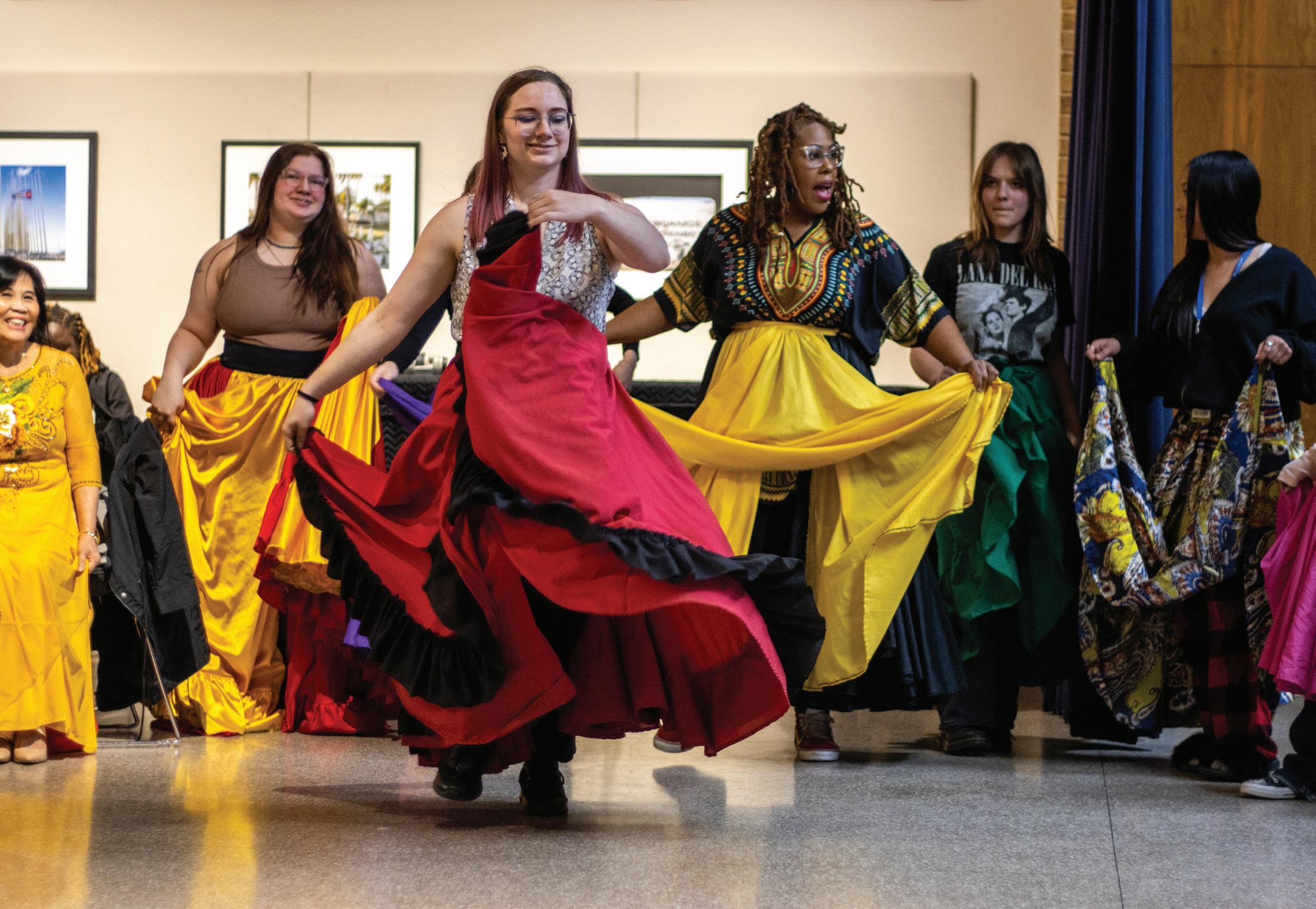
states that the activities of a registered or recognized student organization are not prohibited under SB-17 and can be supported by the college through logistical and resource assistance.
However, according to the FAQ page, employees of the college cannot provide such support as building program agendas and determining guest speakers.
“The bill is vague enough in areas that it leaves it open to interpretation by individual institutions,” said Leigh-Anne Regenold, current NE Faculty Association president. “TCC, by its nature, is a more risk-averse institution than other institutions that may push the envelope and try and challenge things. Big, four-year schools are more likely to do that. But that’s not going to be TCC. That’s not how the institution has ever operated. They’re being protective of taxpayers’ dollars and those kinds of things.”
The SB-17 FAQ also states student clubs and organizations are allowed to host cultural events and invite speakers as long as it’s open to all students, faculty, staff, and the community without implying or enacting preferential treatment.
Not only has TCC canceled events they have hosted in the past, but it has also become increasingly difficult for students and faculty to plan events because the events and posters are being scrutinized by campus administrations.
“We were talking about doing a postelection event where we talked about the election and what happened. You really can’t talk about voting trends without talking about race, gender and ethnicity,” said Regenold, assistant professor and department chair of government and paralegal studies. “That’s how we look at voting. And so, because particular groups vote as blocks, you have to mention that. I said, I just don’t think that we can do this panel and not be in violation of Senate Bill 17, in the way the TCC is looking at that.”
Prior to SB-17, club advisers were able to help students by actively participating in the event logistics and finding speakers. That is no longer the case when it comes to any event that could be considered to fall under DEI.
“If the students come up with the idea, and the students plan it, and the students invite the speaker, then it’s still allowable under the law,” Byrd said.
Each event must go through layers of compliance verification that require approval from a director and one person above them if students want to get an event approved.
In the case when a faculty member wants to plan an event, it goes through the department chair, the dean, the vice president of academic affairs and then to the president.
This process is creating a bottleneck, stu-

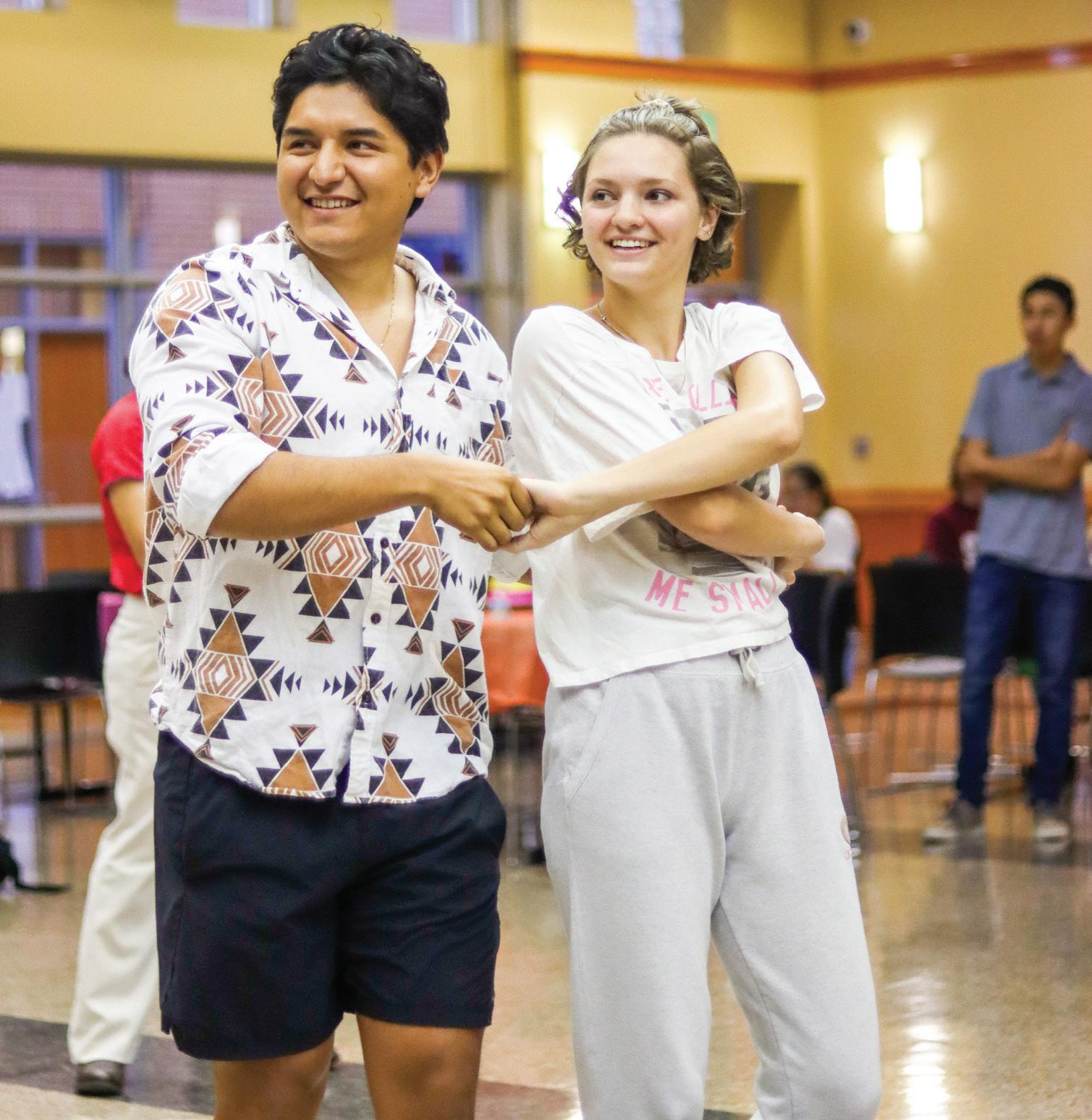
dents say. Whether it’s re-wording flyers so that the names of events don’t have DEI terminology or it’s concerns about the speakers, new requirements have created frustration and fear of repercussions, according to one faculty member and one staff member who spoke on the condition of anonymity because they fear retaliation.
Dallas College, on the other hand, allows cultural events and has been hosting these events on their campuses while TCC has chosen to cancel or change the events.
On its SB-17 FAQ, Dallas College frequently cites Section 51.9315 of the Texas Education Code, which bars institutions of higher education from denying a student organization any benefit that is generally available to student organizations if the denial is based on the organization’s political, philosophical, ideological, or academic viewpoint or content.
According to the webpage, this statute was enacted in 2019 through SB-18 regarding free speech on the campuses of Texas public higher educational institutions.
Allen met with faculty members on different campuses throughout the year to answer questions about SB-17 and what faculty can and cannot do.
“He started at the beginning and went through, ‘Here’s what the bill says.’ Gave us the actual wording. Here’s what is allowed, or what exceptions. Here are the things that are prohibited,” Byrd said. “So, it really gave us a lot of background information to start with. We did get questions over things like writing letters of recommendation, which was a big issue.”
Letters of recommendations for jobs, internships and scholarship references are areas where faculty and staff have to tread lightly due to the ban. TCC’s SB-17 page explicitly forbids employees from writing letters of recommendations based on race, gender and sexual orientation. Some internships, scholarships and grants have DEI wording in their applications. These are supported by grants intended to ensure that those institutions have diversity.
“My answer back then and even today is, ‘Let me write you a generic letter of recommendation,’” Regenold said. “I’m just writing about my experience with you from a teacher/professor lens, all the things that
you’ve done, wonderful leadership skills and group projects and doing things on time, all the things that we put in there.”
Faculty members are not just concerned about events but also the possibility of having their academic freedom taken away. Currently, the law doesn’t apply to the classroom.
“There is literally no way to talk about the 19th Amendment without talking about gender,” Regenold said. “There’s no way to talk about the 15th Amendment without talking about race. You literally cannot do that. And so, what I talk about in my classroom is not subject to Senate Bill 17, and this is a clear exception.”
Texas Republican Sen. Brandon Creighton, who proposed and was instrumental in the passing of SB-17, also proposed Senate Bill 37, which was passed on April 10 and has moved for consideration in the House.
The new bill would establish a Texas Higher Education Coordinating Board Office of the Ombudsman, which could authorize civil penalties.
It would limit how faculty teach history, race and inequality while also giving people the ability to file complaints and sue colleges and faculty over curriculum.
Regenold said a component of the Southern Association of Colleges and Schools Commission’s criteria, includes that faculty have academic freedom. And SB-17 excludes that in certain ways for events and activities outside of the classroom, but faculty should have the right to engage in those things that support course learning objectives, she said.
“I can’t take out of my syllabus or the district master syllabi, discussions about things like discrimination based on race, gender or sexual orientation,” Regenold said. “I mean, we talk about that in the chapter on civil rights. I literally can’t take it out.”
Students say they understand that TCC is trying to follow the letter of the law, but they wish the school would make it easier for diverse clubs to express themselves on campus. “We don’t want TCC to be defunded. TCC has done so much for me, so I never would want that to happen,” Sample said. “But it’s also just separating us more because we see how we’re being treated versus how other organizations are being treated, and it’s frustrating. So very frustrating.”
Activities employee and Student Government Association officer. “It’s just not a good feeling when you realize that you can’t really do anything about it.”
Their responsibilities at Student Activities are to plan, post and host events for students while also publishing flyers for student club events when they receive approval by TCC’s administration.
“We’re trying to be organized and prepared and do our best for the students and the school,” Vadnais said. “We really can’t do our best job if we’re not being approved.”
An event and its promotional flyer must be checked by Student Activities and sent to TCC administrators for additional approval before Student Activities can publicize anything regarding it.
Both Zacarias and Vadnais said they don’t know who oversees approving events, but from what they’ve gathered, it requires multiple signatures and a lot of time.
“I’ve heard from our bosses that it takes a three-month interval,” Vadnais said. “They send it in for an approval and then get approved the day of the event. Then, they have to rush to get everything they need to make it.”
Hosting an event approved the day it is scheduled forces student workers or the student club to officially publicize the event, purchase the supplies needed for it and set it up all within a few hours.
“It’s very conflicting because we want students to be participating,” Vadnais said. “We want to have volunteers come in. We used to have a lot of volunteers.”
Previously, Student Activities would post volunteer opportunities for students to sign up and work at these events. Now, it’s become difficult to provide students with the ability to earn those hours while on campus.
“We can’t reach out to people and ask if they can come on a certain day because we don’t even know what day,” Vadnais said.
If an event is approved with enough time for Student Activities to print a flyer, it needs three mandatory stamps: one stating the event is TCC approved for Student Activities to host, another stating TCC is an equal opportunity institution and finally one saying all are welcome and encouraged to attend.
Flyers must also list contact information for students needing any accommodation to attend.
“It says up to three days prior to the event. If flyers aren’t posted more than three days in advance, how are they going to even reach out?” Zacarias said. “It’s kind of counterintuitive to even have that in the first place if you can’t really do anything about it.”
Both said they agreed these unnecessary loops are being forced upon them by an unknown and unreachable source, who’s not providing them with clear and concise rules on how to follow SB-17’s regulations, making their job challenging.
SE Student Development Services Director Doug Peak said additional approvals from vice presidents and legal teams are now needed to make sure events follow the state mandate.
“It’s just an added layer of someone looking at it,” Peak said. “If you want to have an event, we can have it. There’s not a might be. My VP gets back to me within a day. I send him something, and it’s rare that by 5 o’clock he hasn’t responded.”
SE did not celebrate the Lunar New Year, which was an annual event, according to Vadnais. And SE students also faced challenges when trying to plan events for Black
History Month, Zacarias said.
“The thing is that the law specifically states that federal holidays are protected, so why was it such a problem for us?” Zacarias said. “It doesn’t make it genuine if we can’t have half the events that we used to, which was for the community.”
Many cultural celebrations have been erased from campus life without explanation. Clubs wanting to host events must begin the process much earlier.
South Campus’ Black Student Union began preparing events for Black History Month before the end of the fall semester because they knew there would be issues, according to the club’s Vice President Jahson Anderson.
“It’s like walking in circles instead of just getting straight to the point. We have to do X, Y and Z to get to A, B and C when we’re already on D, E, and F.” Anderson said. “There’s certain words we can’t use, certain things that we can’t do and it’s just constantly updated.”
BSU hosted four events in February to celebrate Black History Month but not without any hurdles. Clubs have always hosted fundraisers, but now the student members are having to do this without guidance.
“Our advisers, or now called sponsors, they’re not allowed to help us,” Anderson said. “It’s harder to do things as a student.”
NE Gardening Club President Fatima Hernandez said her members were concerned for their event to celebrate a Mexican tradition in which one gives an offering to a deceased family member or friend’s spirit in November.
“I remember when the new law came in, we were really worried,” Hernandez said. “I remember it was very specific for my adviser. She told us we will have to cancel it since she is part of faculty, and faculty cannot promote those events.”
However, since the Gardening Club proposed and planned the event prior to TCC providing a website with SB-17 guidelines, their event was not canceled.
“We were lucky,” Hernandez said. “We decided to play it safe this semester, so we don’t have to push back on the stuff we are planning.”
Without proper support, student clubs deal with many complications, and Hernandez said she feels very limited because of this.
“For new organizations or organizations that haven’t faced that, it’s going to be hard at least the first couple times because we don’t really know what exactly to do,” Hernandez said.
Movers Unlimited dance company members Vanessa Lamas and Christopher Garcia wished they knew more about SB-17 prior to NE Campus’ International Festival being canceled.
“We thought it was actually still scheduled. I mean, we had a date,” Garcia said.
“So, we had a plan and everything.”
The students were unaware of the festival’s cancellation until The Collegian informed them. Their dance group has annually performed at the festival, and both Lamas and Garcia said they were disappointed to learn they were no longer doing that.
“I feel like it would have been really good information to have to fight for it,” Lamas said. “We’ve been coming here for years because we thought we were able to be like, ‘Well, this is who I am, and this is where I come from.’
“Now moving forward, it’s gonna be a little scary.”
Dr. Jim Terry, a NE continuing educa-

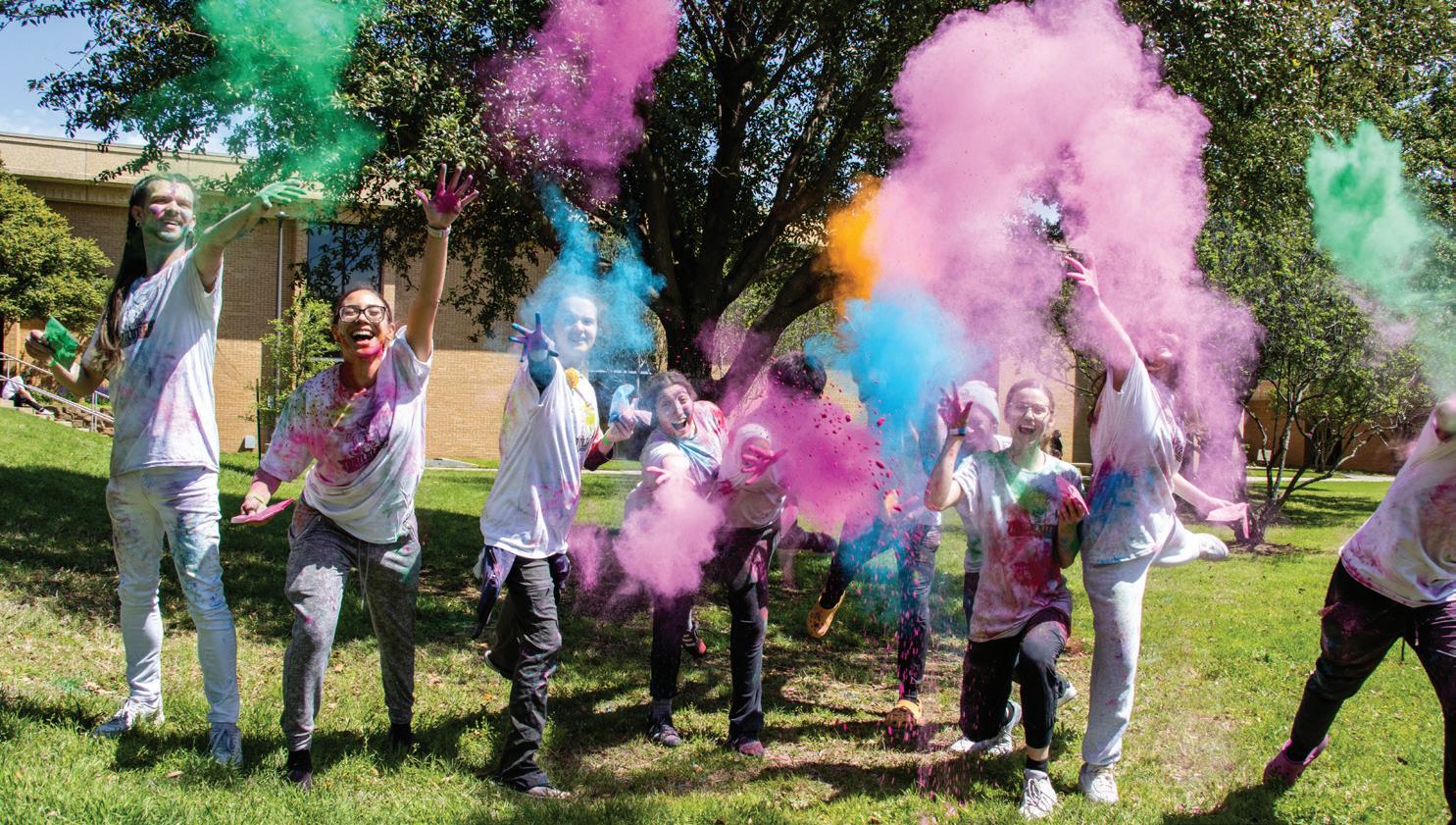
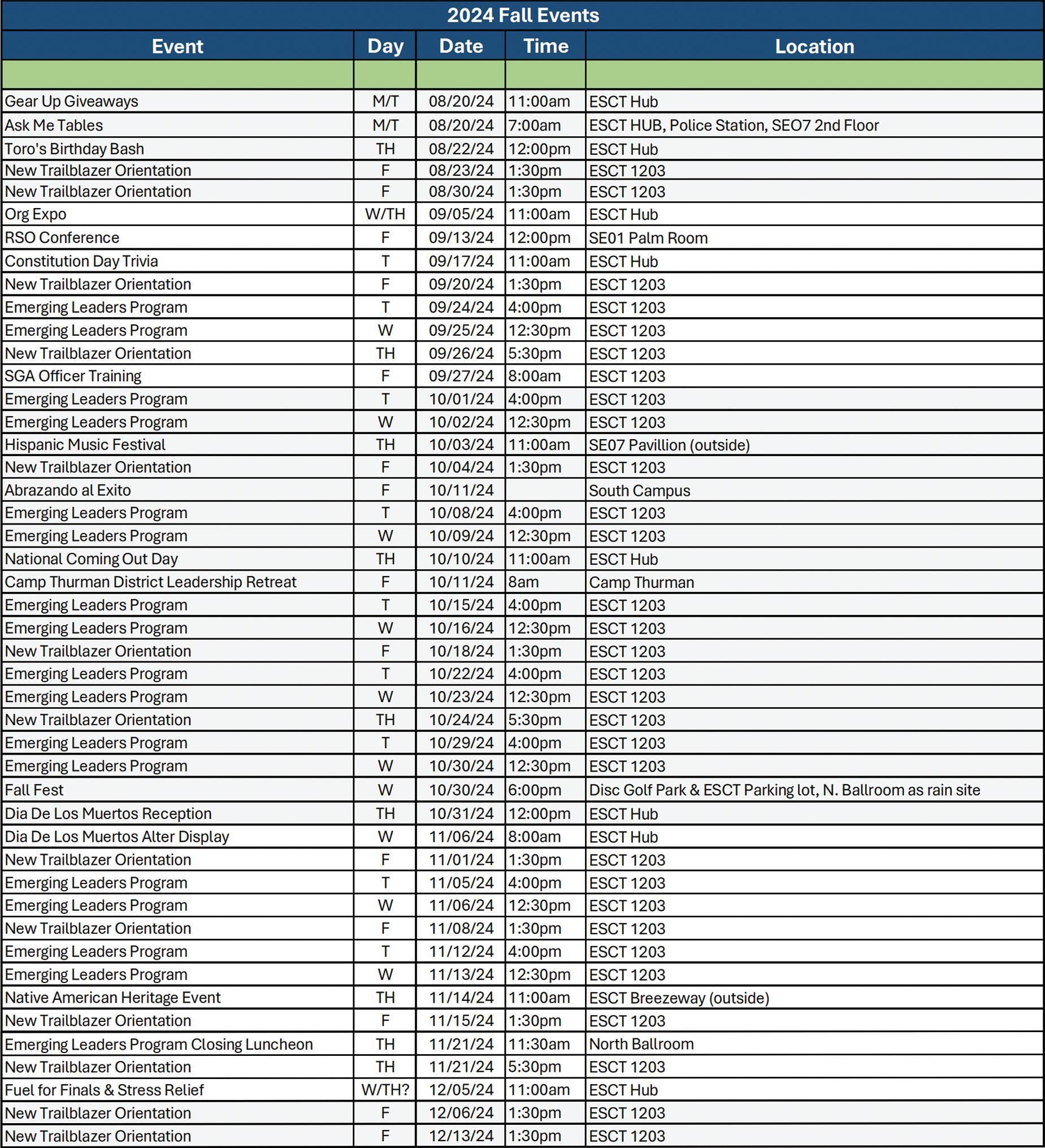
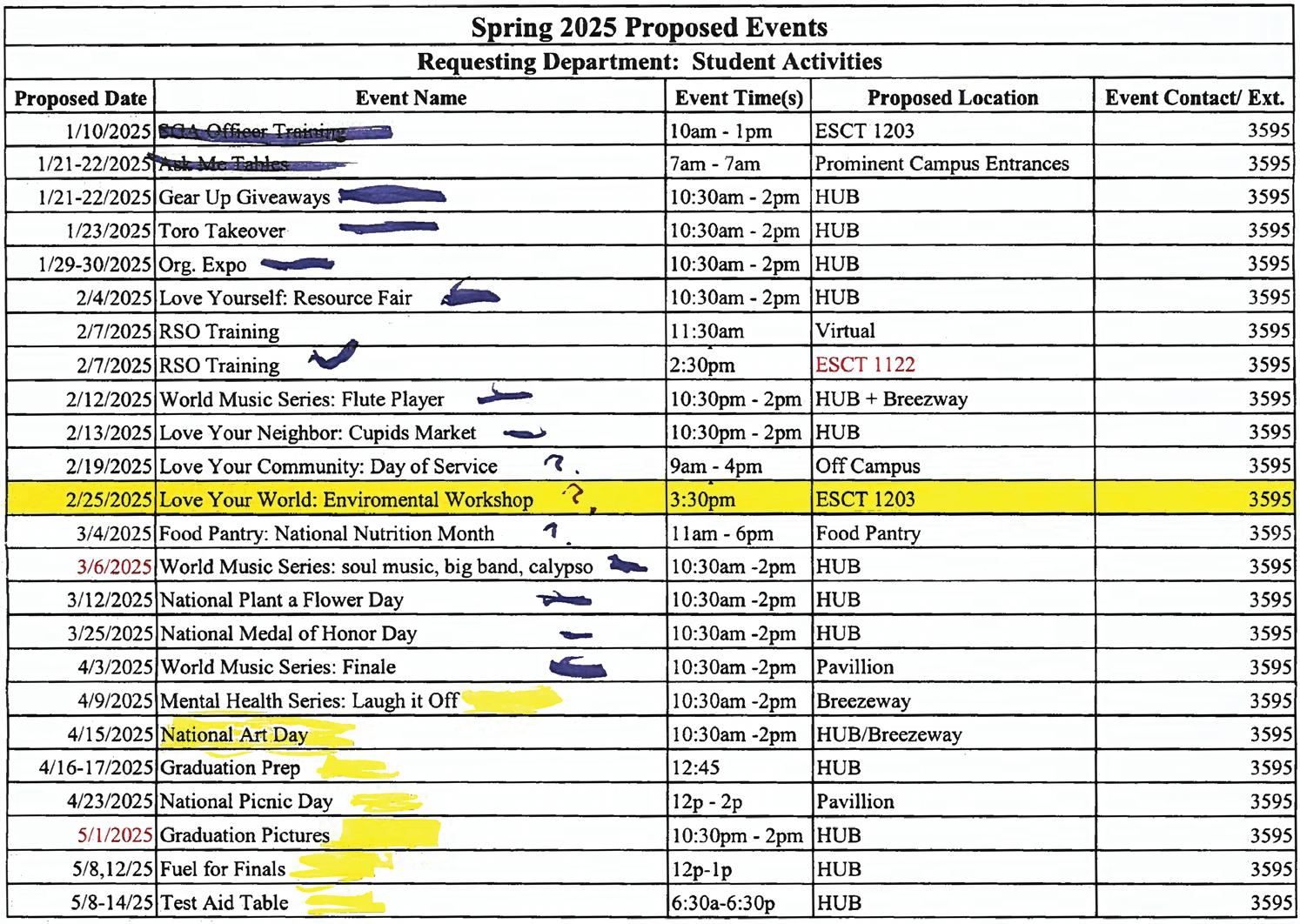
Activities.
tion student and retired primary care physician, is 71 years old. He grew up in the East Texas town of Kilgore during the Vietnam era. He said he witnessed administrations back then try to suppress any counterculture messages.
“It is very, very scary that, particularly on college campuses, and as we’ve seen recently amongst law firms, that you have to be very careful who you talk to,” Terry said. “That’s what’s happening on campus, where faculty is afraid to speak. People’s livelihoods could be taken away from them. Their lives could be ruined.”
He said leaders can tap into and abuse the rights of specific groups in the population, mentioning both Woodrow Wilson’s administration threatening newspapers in the early 20th century and the McCarthy era when many were targeted as communists.
“Those that have the force of their conviction to speak up cannot be ignored. I mean, it got so bad that students were shot and killed at Kent State University [in 1970],” Terry said. “I guess they think they’re doing something good, when they’re actually doing the opposite.”
Diversity is necessary on college campuses for students to be capable of understanding one another, according to Terry.
“A lot of hard work has gone into [events] by a lot of good people, and I’d like to see them continue that, even in the face of persecution. Yeah, I know that’s hard,” Terry said. “Perseverance in the face of tyranny is the most admired trait amongst humans.”
Student Rafael Thompson said he has recognized the culture on NE Campus change.
“I’ve been here for about two years, and I’ve seen and attended most of the events, and I noticed back then, when I first started, there was a lot more openness to conversation. There would be gatherings,” Thompson said. “Lately, there are no events. There’s just Transferring 101.”
He said his experiences prior to TCC’s compliance with SB-17 were the reason he chose to attend this college.
Now, with the severity of action taken by the college due to the DEI ban, his attitude has changed.
“Last year, I would have told people, ‘Oh yeah, you can come here, you can get your basics done, transfer out, make friends, do social events, volunteer and have this big ol’ stacked experience list,’” Thompson said. “But now there’s no events, no opportunities to make friends, no options to volunteer. It’s just your basics.”
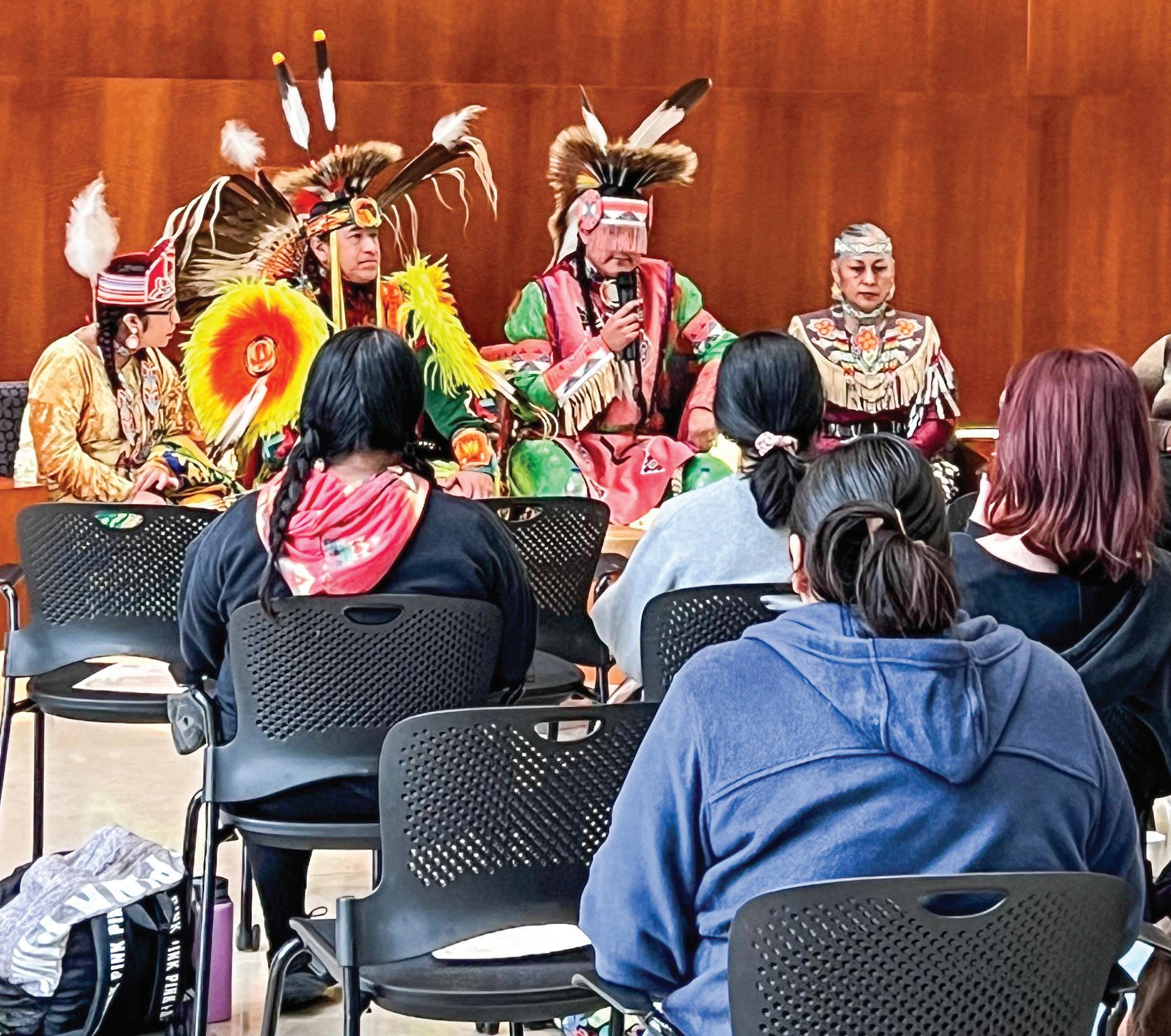
After three back surgeries, Santiago Meza realized he needed to make a serious change to regain his life.
“One time, I went to my mother’s house to work on her attic, and I couldn’t bend over,” he said. “I couldn’t do anything — it was embarrassing. I knew I had to do something.”
Now, Meza said running has given him the freedom of his younger self.
“I’m 60 years old, but I feel 20 years younger,” he said. “I can think better, and I can work a lot. I stay up with my boys. They’re 30 years younger than me, and I can keep up with them.”
Santiago was among community members participating in the Earth Day 5k on April 26, the conclusion to a three-day event on NW Campus.
Kinesiology manager Sarah Matlock said it’s an event that benefits students beyond motivating them to exercise.
“It’s a great way for students to network with the people that work [at TCC],” she said. “And then having those community members come in, it makes it even better.”
Matlock says that by allowing non-students to participate in these events, it serves as a reminder that the college can serve more than its students.
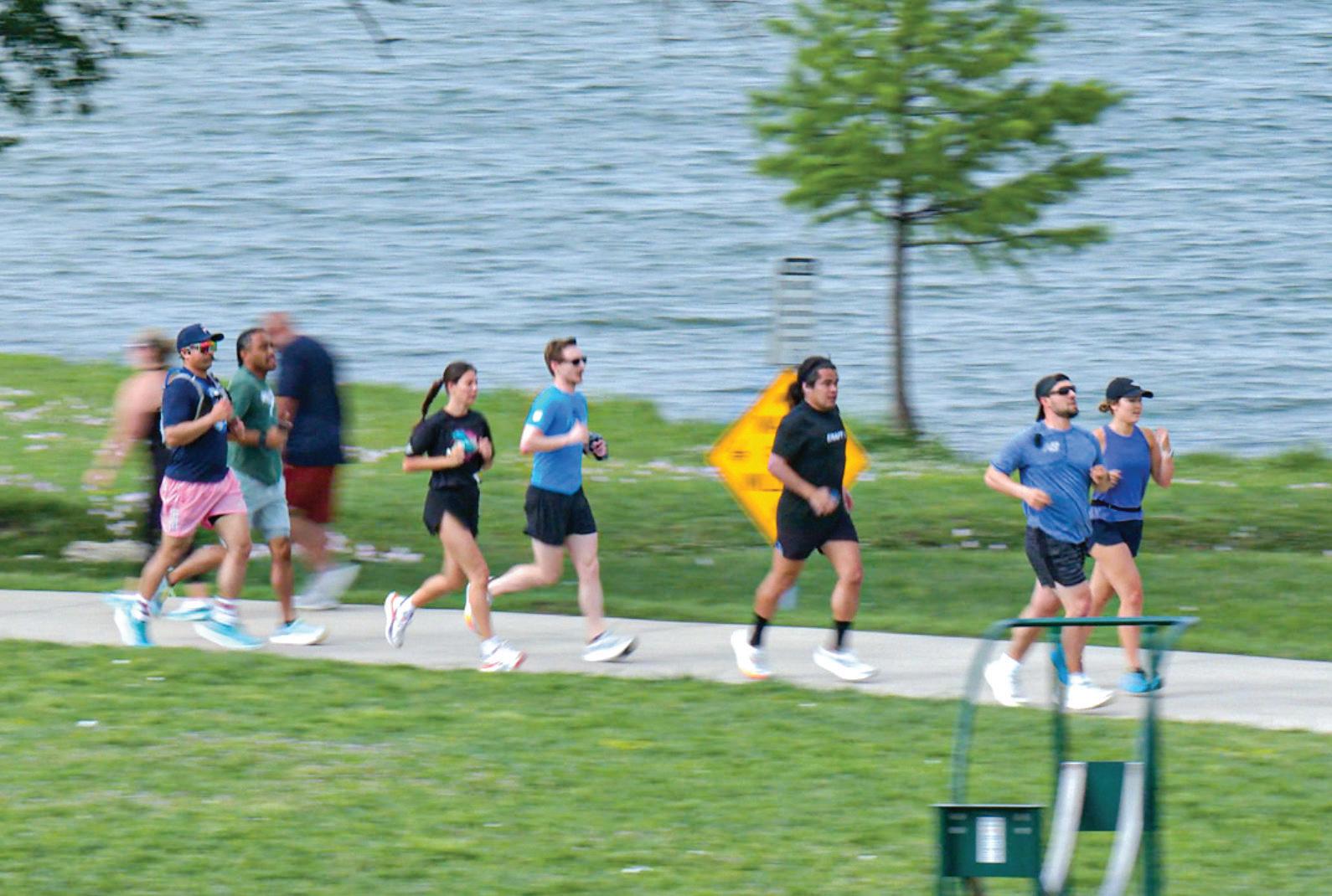
“Bringing the community together is key,” she said. “It’s part of our role as TCC. That’s what we do. We serve the community, and it’s a great way to get students out with some of their instructors.”
Wrapped around Marine Creek Lake, Matlock said the race is a chance for participants to recognize and appreciate local nature.


ther. He said watching his father take control of his health was inspiring.
“He’s a hardworking Mexican, so they’ll hurt themselves sometimes, but he keeps trucking, and I look up to that. There’s no stopping him, and there’s a lot to learn from that,” he said.
Mark-Anthony Meza said he now works to keep up with his father.
“He’s 60, so he can’t be more active than me,” he said. “I try to beat him every now and then.”
Among the runners was Esther Goodwin, a community member who, despite a recent hip injury, was determined to hit the track and run till she hit the finish line.
“You’re testing yourself to see what you can do,” she said. “It makes you feel vibrant and young. It’s exciting, and your heart’s racing, and it makes you feel like you can do anything. And the oxygen you’re receiving from the trees and the water and the lake, it’s very relaxing.”
“We’re out here to celebrate our planet and help promote its preservation and care while getting people active,” she said. “We tie all of these events together into one way to communicate the concerns we have about how our planet is treated and cared for.”
Meza’s son and former TCC student, Mark-Anthony Meza, ran alongside his fa -
Josiah Parker, a student at NW studying to be a teacher, said dedicating time to completing the 5k alongside his peers was an act of discipline and self-love.
“If I’m not trying to be better myself, I can’t push other people to be better,” he said. “But I don’t give up on myself. And when I have other students here encouraging me while I’m running, it definitely brings some joy out of me and makes me want to get to the finish line faster.”
HORTON staff reporter collegian.editor@tccd.edu
NE students learned about gardening, caring for the planet and creating a greener lifestyle during the Earth Day Spring Fest on April 22.
Austin McCabe, who works at NE Student Activities and is the adviser of the Garden Club, said being sustainable is to be aware of waste.
“I really think it just means being mindful about how much we’re creating, how much we’re consuming and how much we’re throwing away, and looking for places to limit what is wasted,” McCabe said.
The Garden Club found ways to recycle plastic cups and coffee sleeves to create planters for the plants they sold at the event. Many of the plants are friendly to local pollinators.
Pollinators, like bees and bats, are disappearing and dying. According to the U.S. Department of Agriculture, pollinators that are unable to find the correct quantity and quality of food will not survive.
Habitat loss is one of the leading factors in the decrease in pollinators, according to the USDA. Planting the correct type of flowers, fruits and vegetables can help ensure pollinators return to the area. Another way to preserve their natural habitat is by composting, which not only helps pollinators but also helps keep waste out of landfills.
“If the bees disappear, we no longer exist,” said Bob Lundin, a master gardener who works with Texas A&M’s AgriLife Extension. “They pollinate 90% of everything that we eat.”
According to the United States Environmental Protection Agency, composting is the biological decomposition of organic materials by microorganisms. Organic materials include grass clippings, leaves and food scraps.
According to the U.S. EPA, wasted food is the most common material sent to landfills. Wasted food is responsible for almost 60% of landfill methane emissions. Composting puts nutrients back into the soil and can help promote plant growth.
NE student Emma Fuentes has implemented composting in her daily life.
“I’ve just been putting leftover fruits and vegetables in the flower garden my mom has, so it can help them grow,” she said.
Living a sustainable lifestyle is not difficult, but it takes intent, McCabe said. She mentioned that while a sustainable option might cost more at first, in the long run, it is cheaper than buying single-use products.
TCC is working on ways to create a more sustainable campus. According to the school website, they have created a threephase plan to protect the environment. TCC is currently in phase one, which includes being transparent in their efforts and trying to reduce their greenhouse gas emissions by 10% by the year 2030.
“I think everybody has to determine what they’re willing to do. What they’re willing to change, what they’re willing to try that could have an impact,” McCabe said. “Every little bit helps.”
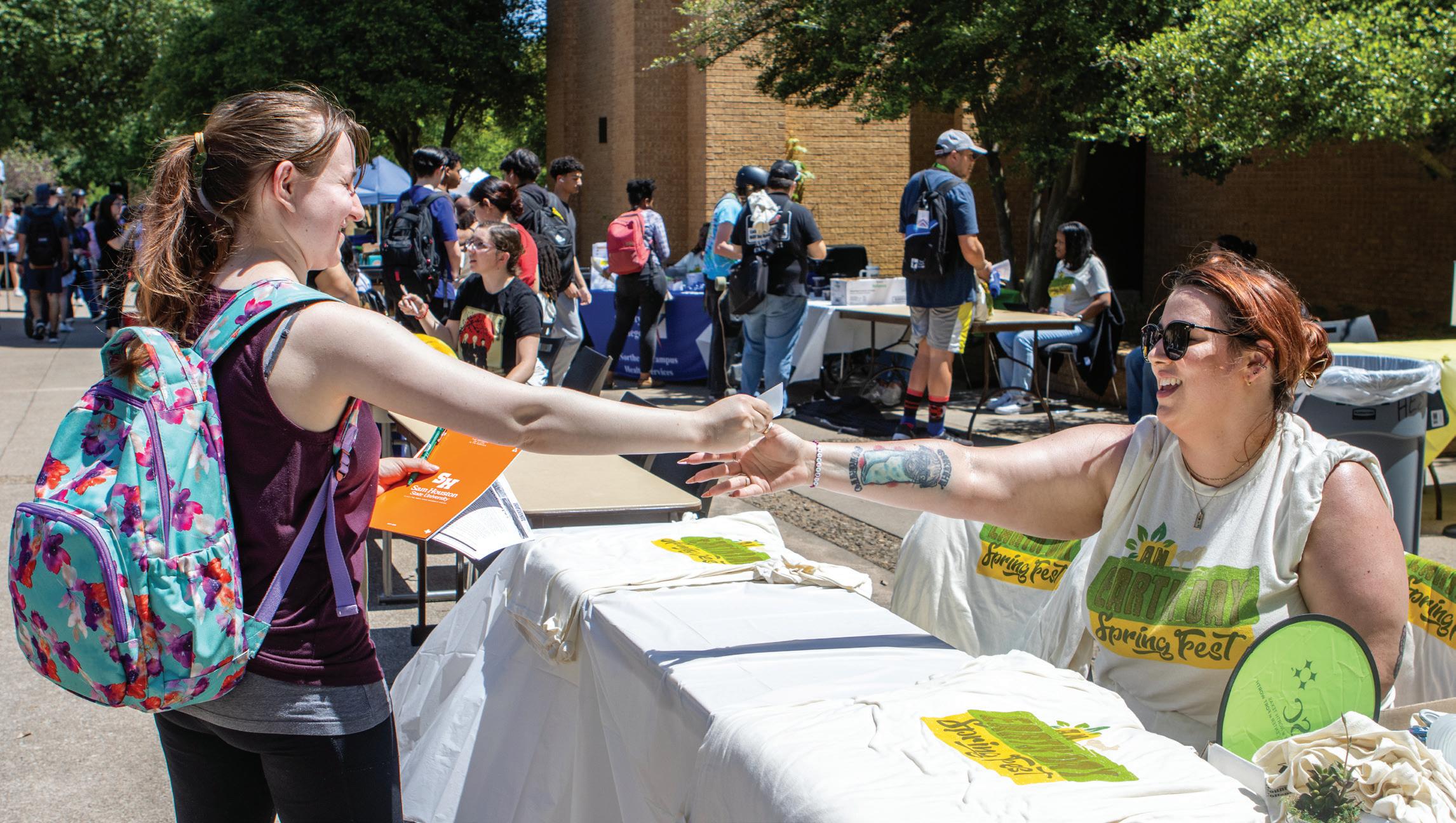
Q: “How do you feel about AI’s impact on the environment?”

Imani VotionAlameddine NW Campus
“I can’t imagine that it won’t. It has an impact on everything, especially jobs. I don’t know nearly enough ... I’ve never really thought about that. I remember having an assignment about AI and the environment, discussing what it takes to run ChatGPT. It uses a lot of water.”
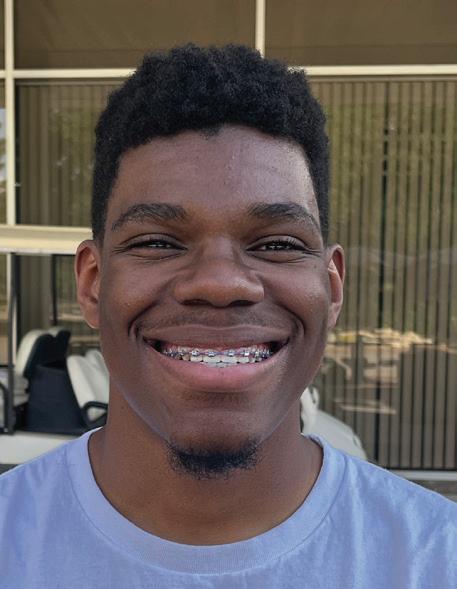
Ian Jordan Smith South Campus
“AI has grown significantly over time, especially from like 2020, 2021. When it first started out, it was still doing these little baby walks. You know, humble beginnings ... But with the environment, [I’m] not really sure about it but I think it’ll be a huge type of impact for our environment.”

Suleima Guerrero NW Campus
“I saw this article online saying that it’s leading to a lot of greenhouse gases, a lot of emissions. Our environment is already not in the best state, and it’s not just impacting our environment, but us as people, as students and any students in the future, especially since they don’t have to think for themselves.”

Jerry Almanza South Campus
“I do know that it takes so [many] gallons of water for simple questions that everybody’s using to ask AI, especially now that it is so advanced, and everybody’s using it for school questions. So, it is dangerous and something to look out for, I believe.”
April 17
TR: Criminal trespassing on the Texas Electric Power Plant owned by TCC. This case remains active.
TR: Criminal mischief resulting in damage of $2,500 or more but less than $30,000 at the Texas Electric Power Plant owned by TCC. This case remains active.
April 21
NE: Disorderly conduct that disrupted the public peace by using abusive or profane language was reported.
SE: A threat to commit any offense involving the intent to place a person, the public or a substantial group of the public in fear of serious bodily injury in SE07.
April 24
SE: A form of intentional physical or provocative assault was reported in the main building.
SE: Harassment with an intent to alarm, abuse, torment or embarrass was reported in the main building.
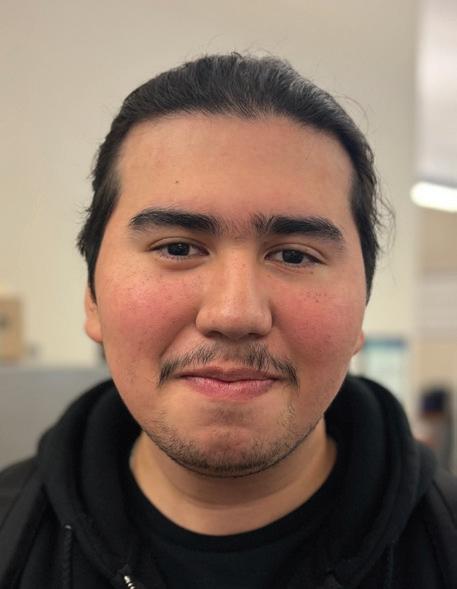
Juan Tirado SE Campus
“It will affect, but in an aspect if we restrict it, we’ll be able to expand AI in the same way. So, if we’re able to minimize and renew some of these objects, the environment won’t be really affected by it by being able to expand or minimize the area of the power plant to not affect the environment.”

Cybil Schwerdtfeger NE Campus
“I never want to be an antifuturist, because I understand why [AI is useful]. But also, the problem with futurists is that they’re always looking into the future and not the now. ... They’re not considering that they’re going to destroy the environment right now, and there’s going to be no future if they continue to try to push this.”
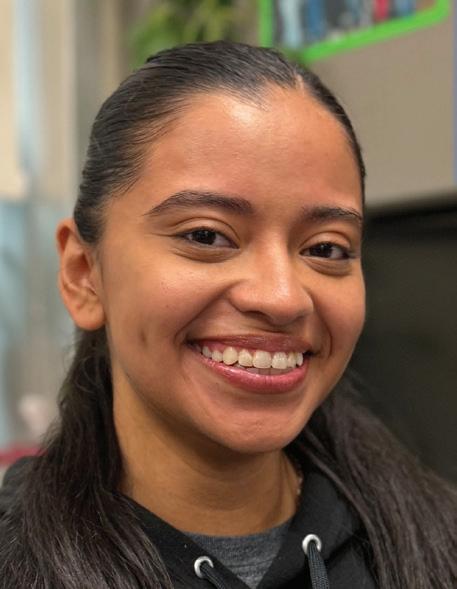
Madelin Alvarenga SE Campus
“I don’t know much about [it] ... But I feel like technology in general, it’s taken away from people realizing what’s around them. They’re just mainly focused on technology and on the phone ... they don’t actually care about it [environment] anymore as they used to
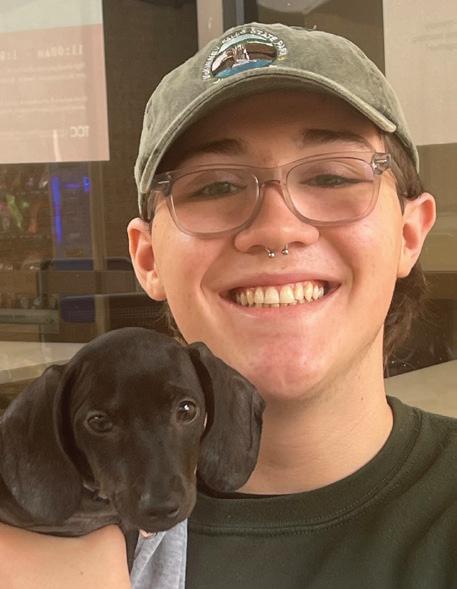
Jaxon Meyers NE Campus
“America’s power grid sucks so much. That’s something that should have more focus than AI’s impact, because once we look at that, we can look at how can we make this energy more efficient. Ultimately, though, if I had the choice, to live in a world with AI or without AI, I would choose without.”
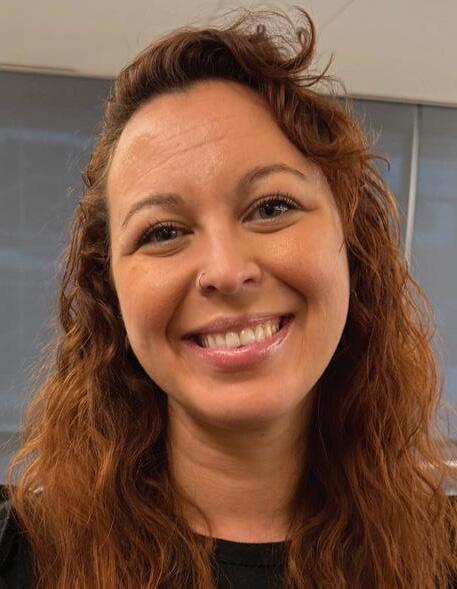
“I
May
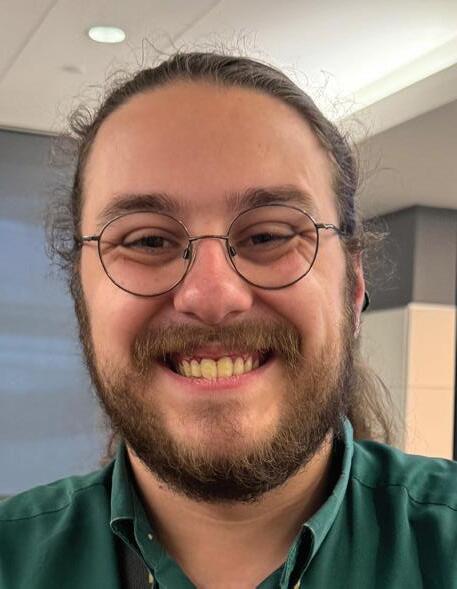
“I

DIEGO COLLAZO campus editor diego.collazo@my.tccd.edu
“Sinners” director Ryan Coogler took the vampire trope moviegoers know well and infused it with comedy and themes of race and culture to create one of the best movies to hit the big screen this year.
The film stars Michael B. Jordan in dual roles as twin brothers returning to their hometown in Clarksdale, Mississippi, in hopes of opening their own juke joint. They recruit their cousin Sammie Moore, talented blues guitarist, and other townspeople to join them.
Everything is going according to plan, the juke joint opens and the residents of Clarksdale are enjoying themselves until an evil arrives wanting to take everything away.
The movie takes place in the 1930s, so it isn’t difficult to see that vampires are symbolic of the White man wanting to claim what Black people have for themselves, but
Coogler takes it a step further.
His use of blues music and cultural reference is striking and helps push the plot and themes of the movie.
In one of the most powerful and stunning scenes, which would be sinful to reveal here, Miles Caton as Moore has a performance that transcends time, invoking spirits from the past and future in a moment that captures the essence of the genre in all its glory.
The music is so powerful and important to the community that it can connect generations who can feel that energy in the theater.
Blues music is often associated with the devil since its origin stems from juke joints in the 1930s, which were often seen as sinful and immoral. But for the people making blues, it was never about that.
These songs allowed black culture to live on in an era where Black people had little to look forward to. Coogler was introduced to blues by his uncle, gaining a real understanding of what blues stood for, and he did a wonderful job capturing that on film.
Another reason the movie works so well
is because it’s such a slow burn. That’s not something you usually want to hear for a movie that’s 2 hours and 17 minutes long, but for “Sinners,” it works.
That time is well spent introducing the characters and developing the relationships we see for the rest of the movie. The human emotion given to each character is impactful, especially in the later scenes.
Viewers have a reason to cheer for the characters, and it helps create an environment that draws the viewer into the world and keeps you invested throughout the entire runtime.
While the relationships are well thought out, it’s the actor’s execution that brings them to life.
The performances from stars Jordan, Hailee Steinfeld, Jack O’Connell and Omar Miller don’t go unnoticed, but it was showings from Caton and Delroy Lindo that really stand out.
Caton made his acting debut with this film and hit it out of the park. He was incredibly natural and strong in the role, especially
for someone new to acting. Saying he brought heart and soul to the role is an understatement. If he wasn’t getting called for roles before, his line is definitely getting flooded with opportunities after this masterclass. As an old, drunk, hardened bluesman, Lindo brings a natural solemnity to the role of Delta Slim. His performance blends humor and emotional depth with masterful precision fans have come to expect from him. Some viewers have been critical of the overambitious narrative scope of the film, saying the genre blending makes it difficult to grasp the central storyline, but that ambition is what sets “Sinners” apart from other films. Rather than staying true to one idea, “Sinners” mixes genres to capture the complexity of not only the character but of a place like Mississippi in the 1930s, where trauma, faith and art collide. It may not be neat, but it’s alive.
FRED NGUYEN campus editor collegian.editor@my.tccd.edu
“The Beekeeper’s Picnic - A Sherlockian Adventure” is a love letter to the Sherlock Holmes stories that have delighted readers for well over a century.
With a cozy pixel art-style and fun mysteries, this point-and-click adventure game was programmed, written and visually designed by one person, Helen Greetham. The game has been in development since 2022 and was released March 26 on PC.
“The Beekeeper’s Picnic” is very impressive for such a small production team.
The game controls are sometimes awkward and some of the dialogue boxes are incorrect, but otherwise, the game is very polished. The ability to make deductions in Holmes’ mind attic based on information he had gleaned from items or people is unique and fun to play.
While the mysteries of the game aren’t overly complex as a typical Holmes case, they still are fun to navigate and solve.
There are also quests that players wouldn’t notice unless they are thorough in their investigation of the village. There’s a
completely optional quest in the game about reuniting a family that is heartwarming and is an example of the game’s dedication to detail.
If players are stuck, though, they can also call Holmes’ brother Mycroft at the Diogenes Club in London for help, which makes the game accessible to almost everybody, even if they aren’t good at puzzles.
The strongest aspect of “The Beekeeper’s Picnic” is its obvious love for the source material and the characters of Holmes and Watson.
The game is packed with references to the Arthur Conan Doyle short stories. As a longtime fan of Sherlock Holmes, I spent half of my playtime looking out for these little details and got excited whenever my favorite cases were mentioned.
The voice acting in the game embodies the diverse cast of characters and meshes well with the character designs.
The character portraits are especially charming in their design, and the art of the game in general perfectly shows what players should expect: a gentle, wholesome adventure that sucks you into the world of an English village.
Holmes and Watson’s relationship is perhaps where the game truly shines.
The premise itself is centered around the fact that Holmes and Watson are partners who
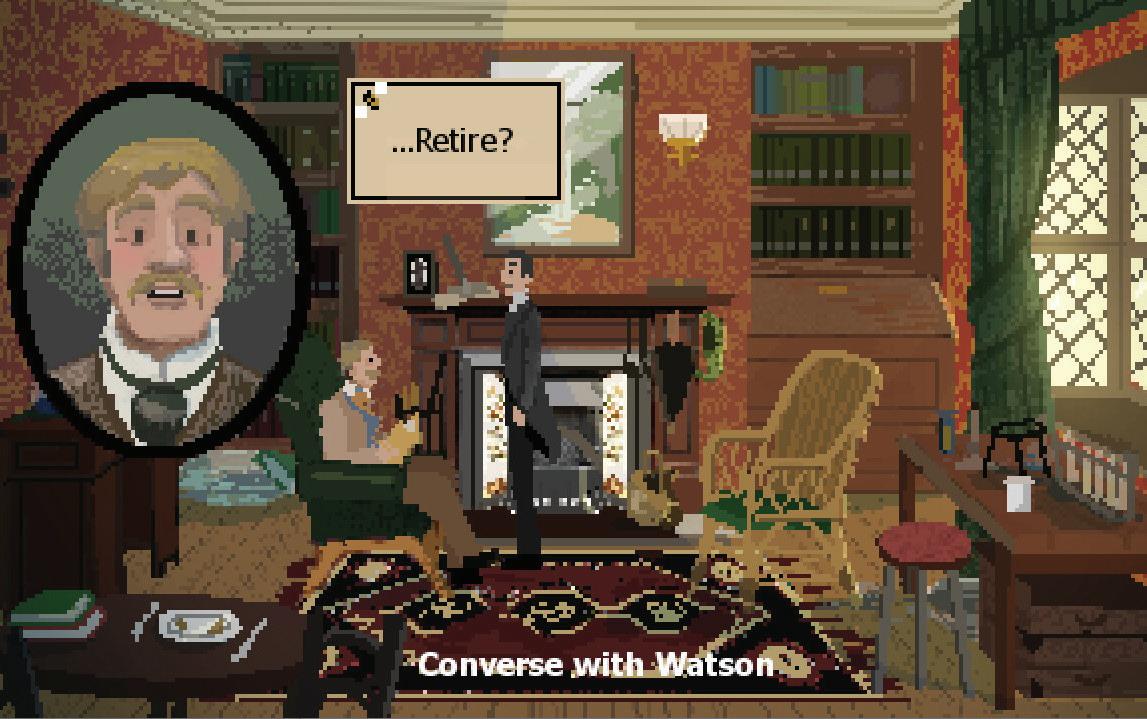
have been with each other for decades. It’s constant in every adaptation that Holmes and Watson are each other’s important person, regardless of whether that relationship is romantic or platonic.
“The Beekeeper’s Picnic” lets players decide for themselves what Holmes and Wat-

As Donald Trump enforces targeted attacks against international students and anti-DEI policies, college students are feeling the impact. These issues are not only harming the student population but are creating long-term negative consequences for institutions.
There is an increasing fear for international students’ as visas were revoked. According to Inside Higher Ed, over 1,800 students have had their student status changed in the United States.
Five of those students are from TCC, with no reason given as to why their visas were revoked.
As of April 25, the Trump administration has begun to restore the legal status of international students whose visas have been impacted. However, Trump is known to flipflop between policies and it’s unreliable how long these reversals may last.
The Trump administration was going after anything from small traffic violations to exercising the right to free speech. But it’s largely unclear as to why visas were revoked, creating fear for international students in the United States and discouraging those abroad from studying here.
Data from the U.S. National Science Foundation shows that foreign students hold more than a third of doctorates in science and engineering at U.S. universities. Many
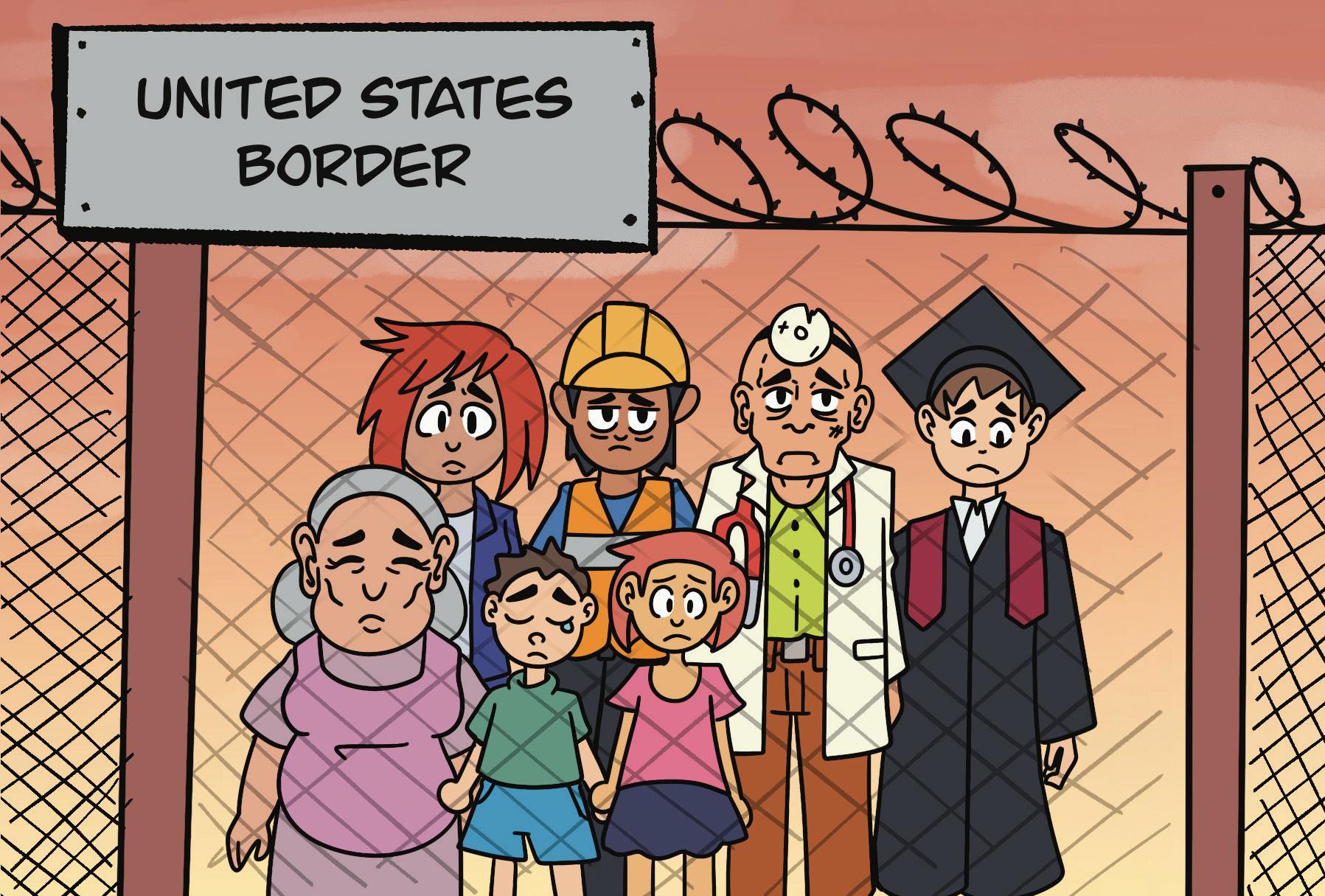
of these students choose to stay here and use their expertise to contribute to American causes.
The decrease in international students studying in the U.S. will take away essential ideas and innovations from American society. It will also impact college life, which thrives on the exploration of different viewpoints.

Not many people know I’m an older student who took the long, winding road back to college after 16 years of being a stay-at-home mom.
Relearning how to learn and adjusting to being part of a new community all involved some adjustments.
The pandemic was a time of unease and fear, but for me, it was also a time of contemplation about the things that I had wanted to accomplish in life. In a time of uncertainty, I realized that there were a lot of goals that I had set for myself when I was younger that I still needed to achieve, not just for myself but for my family, especially my parents.
I promised that I would eventually return to school after getting married and finishing my degree. This was the only thing they asked of me when I got married when I was 20.
While it hasn’t been easy, it’s also been a time when I could embrace the idea of community and my support system. My husband and kids who had to change their expectations of me completely, had to step in and handle some of the things I used to do for them and become more independent. They stepped up and supported me every step of the way.
It wasn’t just family. Everyone I work with has reinforced that idea of community. For those of you who don’t interact with us daily, if you saw us together as a group, you would understand that The Collegian staff embodies the term community. There is plenty of diversity, equity, and inclusion in our personal lives and appearance.
We have older students, younger students, students from different racial backgrounds, and students from different nationalities. We all came together under the banner of free press, sharing stories that

as intellectual progress will be severely impacted.
Secretary of State Marco Rubio was adamant that many international students were disruptive to the flow of academic life even though there is hardly any evidence of this being true.
“We are not going to be importing activists into the United States,” he said in a press conference. “They’re here to study. They’re here to go to class. They’re not here to lead activist movements that are disruptive and undermine our universities. I think it’s lunacy to continue to allow that.”
This kind of rhetoric pins citizens and noncitizens against each other, with noncitizens being considered a threat without any evidence. America will continue to lose important minds that contribute meaningful resources and ideas if it continues a mass deportation agenda.
The rampant goal to kick foreigners out of the country ties in with anti-DEI initiatives. Students are losing impactful resources and experiences as the Trump administration carries on with discriminatory practices rooted in racism.
College students will be missing out if they aren’t able to be exposed to cultures that are different from
are important to the TCC community, its students, faculty, staff and the community at large who spend a lot of time on our campuses for various events. The friends and connections I made along the way have made all the difference.
Academically, learning journalism hands on at The Collegian has had a bigger impact then attending lectures at a university.
Telling these stories under the guidance of our advisers, production manager and administrative assistants has been the best experience of my career so far.
Every member of this team cares about what’s happening across the district. They care about every campus, and we work really hard to tell stories that every campus can be proud of. Reporters, designers, photographers and multimedia professionals all work together every single week, on top of family commitments, second jobs and very busy class schedules.
I couldn’t be prouder of the work we’ve done the last two semesters, during which I’ve been editor-in-chief, or of the feedback we’ve gotten from other people across the district. We have received the kindest, most encouraging calls, emails and people stopping us in the hallways to tell us that they liked a news story or the whole newspaper issue.
Even people who don’t always like our headlines or the stories have championed our ability and constitutional right to tell those stories even if it sheds light on issues they don’t want to be public.
Unfortunately, there won’t be a next story by me on The Collegian after this paper. I finish my own race to graduation, transfer to university and start my first internship at the Star-Telegram this summer. I am getting closer to my parents’ dreams of seeing their oldest child graduate.
While it’s sad, the work we’ve been doing and everything I’ve learned from our advisers and our team has prepared me for this moment. I walk away to find another community to tell stories and to continue the work I started here, even if it’s during a political climate where the First Amendment is being squeezed out.
Thank you for your readership, and thank you to The Collegian team who have worked very hard to bring this community weekly news.
theirs, and institutions should make a greater effort to do what’s best for their students, including their international students.
The administration is sending a strong message that it can punish its noncitizens in any way it wants to suppress activity against the government. This should raise alarm bells and create pushback from the people,
As a society, we should acknowledge the injustices taking place as an affront to human rights. It should bother us that the government is being unnecessarily violent against marginalized groups, citizens or not. Many deported non-citizens are taken to prisons lacking ethical practices, which should inspire resistance.
We need to be vocal about why mass deportation is wrong. Not only to protect intellectual progress, but to protect human rights.

For years, college athletes were strictly prohibited from profiting from their name, imagine and likeness, but in 2021, the NCAA began allowing athletes to cash in on their NIL, a ruling that in its current state is killing college sports.
The pre-NIL era was rough for the NCAA’s biggest stars. They saw their schools make billions of dollars, all on the backs of their hard work, from ticket sales, merchandise and sponsorship deals all while being told they couldn’t make a single cent without facing repercussions.
Athletes and fans all over America finally had enough of the predatory actions taking place. So, what did the NCAA decide to do? They opened Pandora’s box, ushering college sports into the NIL era without a second thought. Now, four years later, the careless decision to adopt the policy change with no regulations is playing out horribly.
Former University of Tennessee quarterback Nico Iamaleava had a NIL deal worth $8 million over four years. But even after a subpar season, that wasn’t enough for him.
He entered negotiations with the team asking for $4 million a year and refused to play until his contract was reworked. Tennessee made the best decision possible, telling him it would be moving on from him.
This set a very important precedent of no one being bigger than the program. Iamaleava later committed to University of California, Los Angeles for a rumored $1.5 million.
These disputes are the new normal in the NIL era. As time passes, we will see more and more players sitting out, but the blame doesn’t fall solely on NIL.
Around the same time the NIL floodgates opened, the transfer portal was revamped. Now, players can switch schools



without having to sit out a year, a move that was meant to empower athletes. On paper, it sounds fair. Why should coaches be allowed to jump ship whenever they want, but players can’t?
The problem isn’t the idea but its execution. What was supposed to give athletes more freedom has spiraled into chaos. When paired with unregulated NIL deals, the portal has become a glorified free agency system. Loyalty is optional. Team culture is crumbling. And schools armed with more aggressive boosters are buying talent.
We are seeing top players transfer not for better coaching or more playing time but for a higher paycheck. And while some athletes are surely making smart business decisions, the broader impact is hurting the college sports landscape. Teams no longer have time to build chemistry. Coaches have no way of planning long term, and fans are watching their favorite players leave for more money.
Just look at Baylor University’s men’s basketball team. Following this recent season, the entire roster entered the transfer portal, graduated or declared for the NBA draft. In a matter of days, a nationally ranked program was gutted. That kind of mass exodus doesn’t happen without major NIL incentives waiting elsewhere. This isn’t just Baylor’s problem — it’s a warming sign for other teams.
This isn’t about being anti-player. Athletes absolutely deserve the right to profit from their talent. But the NCAA’s hands-off approach has led to an unregulated mess. Without guardrails, college sports are losing the very things that made them special — passion, pride and the pursuit of something greater than money.
In professional leagues players have unions to protect them and ensure their concerns are voiced. If the NCAA is determined to keep NIL and the transfer portal the way it is, they need to make sure their athletes are being protected and need to consider putting such systems in place.
If this trend continues, college athletics will be indistinguishable from the professional ranks, only with less structure, consistency and accountability.
The NCAA needs to act now, not to revert back to the exploitative past but to establish a future that balances player rights with the integrity of the game.
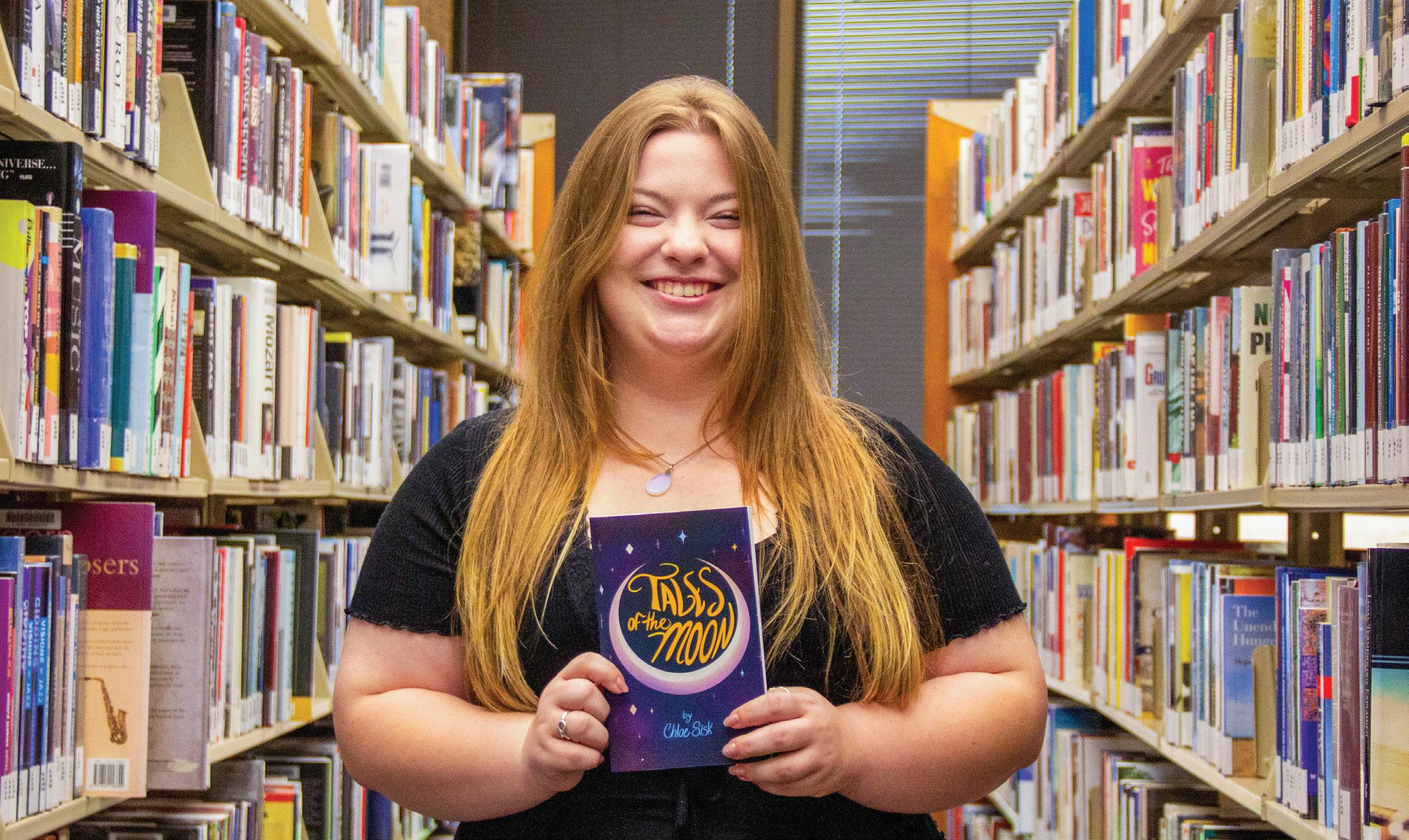
HUDA QURESHI managing
editor huda.qureshi@my.tccd.edu
Before NE student Chloe Sisk became a published poet, she needed to make a drastic change to save her life.
“I didn’t care about school,” Sisk said. “I didn’t care about my health. I didn’t care about anything. The only thing I cared about was that day and surviving. And surviving wasn’t living.”
Her life went by with days upon days in bed and frequent panicking, sometimes resembling a heart attack. Fighting against layered mental and physical health issues, she was unsure how much longer she would be able to live in her state.
“Living becomes a dangerous game when emptiness becomes fulfilling,” Sisk writes in a poem titled “Delicious Soft Voices.”
She found a way out through a friend in Arizona who was looking for a roommate. With no substantial travel experience, she suddenly found herself putting all her stuff into a U-Haul and heading to completely unfamiliar territory.
Sisk was living in Prescott but spent time in other cities like Sedona, Phoenix and Jerome.
“I mean all those places are beautiful,” she said. “They were like nothing I’ve ever seen before, and it just made me realize that there’s so much more to the world that I want to see and so much more than I want to experience. It just gave me a more positive outlook on everything.”
She was on a drive when she was struck by the intricate connections between every part of the environment, seeing the way the gravel in the parking lot was the same kind of rock in the mountains.
“I kind of realized nature is the most consistent thing, and nature will always prevail no matter what we do,” she said. “The earth is bigger than we are, and nature is also around us, and I think that’s the root of life and inspiration for everybody.”
Sisk has had a connection to nature since she was young. Her cousin pointed out how many stars were visible when she visited 10-year-old Sisk, who hadn’t thought about it before.
“I remember standing in my driveway just looking up and it felt like I saw the night sky for
the first time,” she said. “Even though I’d always seen it every single day, somebody else pointing it out to me, that’s when I really took in the stars and the moon and just the beauty and the privilege of seeing where I lived. And it made me value what I saw every single day more.”
She said she knew she would only be in Arizona for the time she needed to be before she moved back to Texas.
After so much time hiding, she was able to embrace the world outside her bedroom and became inspired to write. She had wanted to be a writer full-time, but didn’t see it as a possibility.
In 2024, Sisk published “Tales of the Moon,” a book of poems exploring growing pains that she experienced as she went through her adolescence.
“It’s physical evidence that I lived through something,” she said.
Zoann Boller, a long-time friend of Sisk’s, said she loved her book and was happy to support Sisk.
“I think it gave very good insight of being a young woman and how to deal with certain emotions, like happiness, grief, sadness,” she said.
She lost her father when she was 10 and developed a fear of death later in her life, after graduating from high school. She wrote the poem “Death’s Coach” which became her saving grace in overcoming her fear.
In the poem, she personifies Death into something she could make sense of.
“It was just suddenly no longer a scary thing,” she said. “I hadn’t even realized how much better I had gotten mentally until I’d written that poem.”
A long-time friend, Daniela Cantu, was impressed by the way Sisk pulled herself out of a tough situation and used her creativity to publish her book.
“She had the momentum for her to become something larger than herself,” Cantu said. “And to pursue her dreams of being an author.”
Sisk said her younger self was convinced that her life would continue to be tragic, and she would stay stuck where she was.
“If I told her that I lived out of state, and I’ve seen all these places, and I published a book, she’d be shocked,” she said. “But she would also be amazed and hopeful and astounded.”

spent her adolescence battling
to find meaning through her writing.

Death heeled his coach so gently swift and stepped down to the ground. He sauntered toward me quietly and held his cold hand out.
I looked into his darkened eyes empty, but not void. A thousand songs sang into them, a waltz I can’t avoid.
I hesitantly took his hand, he helped me to my feet. He tipped his hat to bid farewell for again, we’re sure to meet.
cerpt